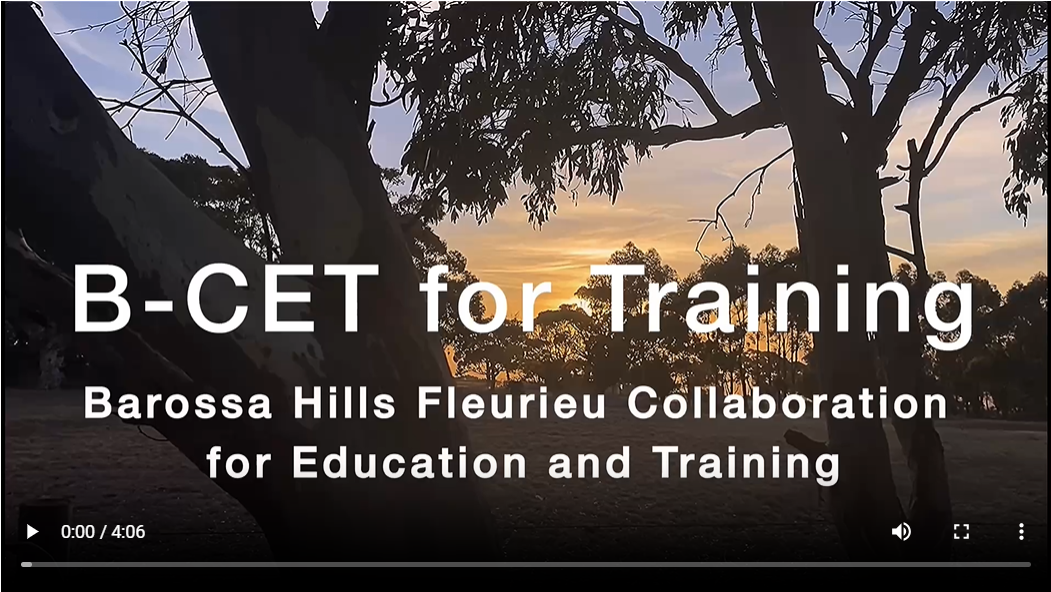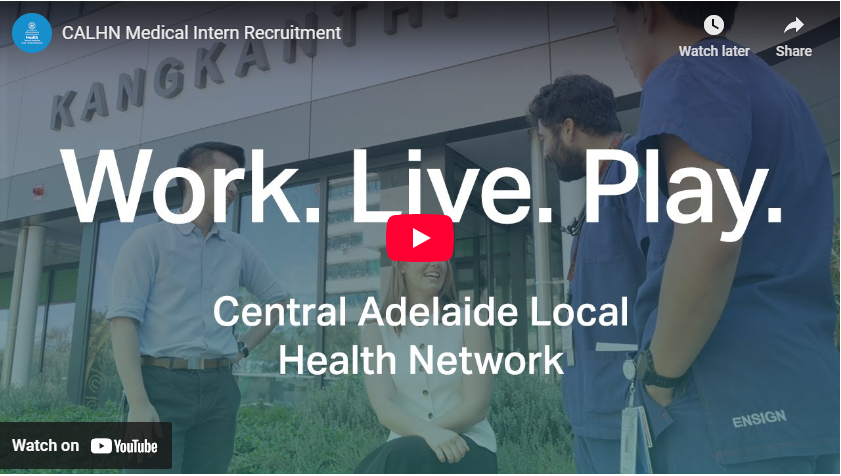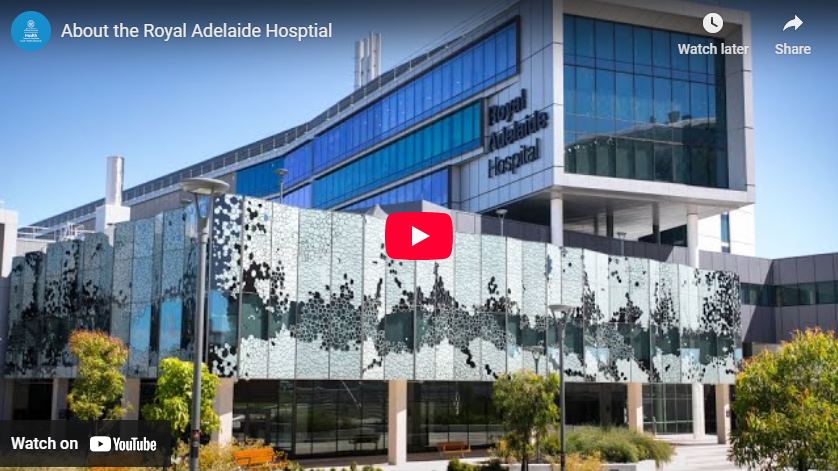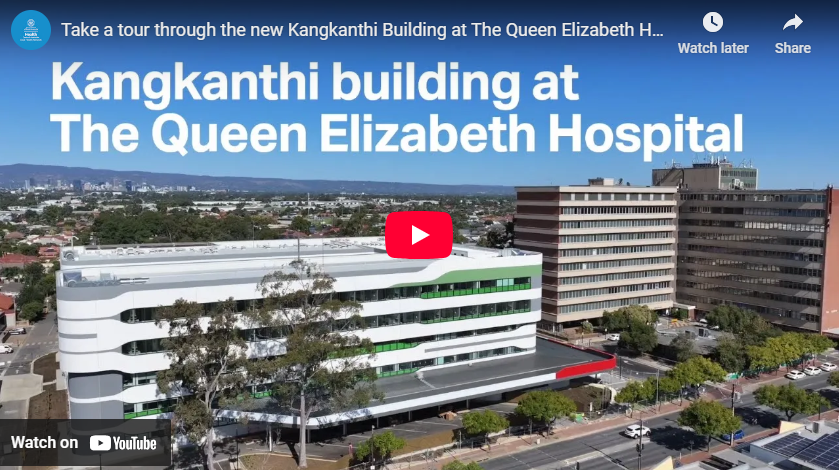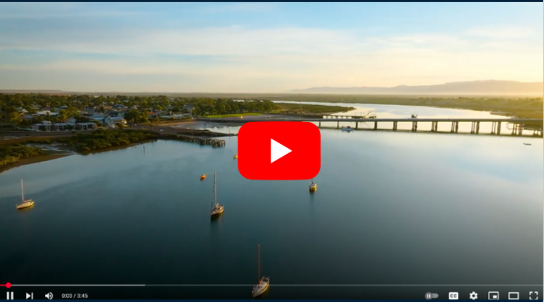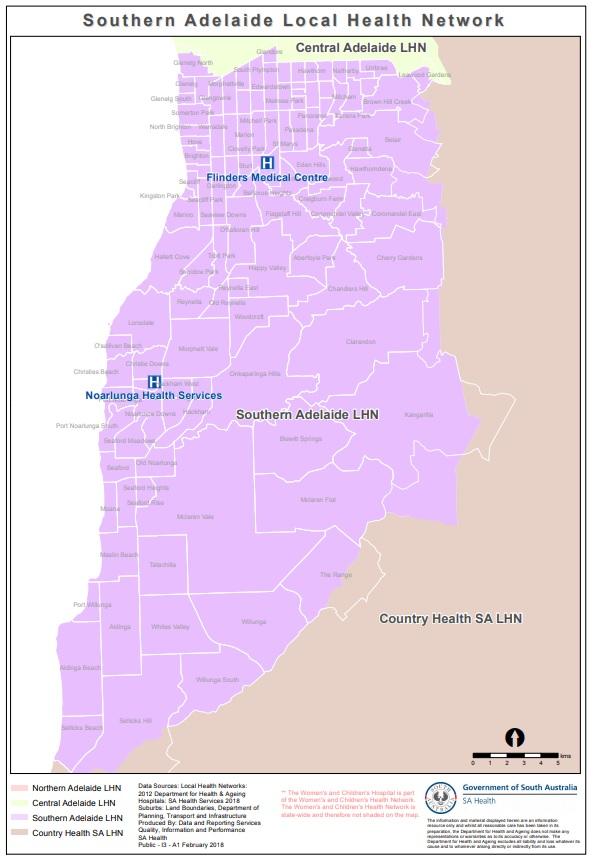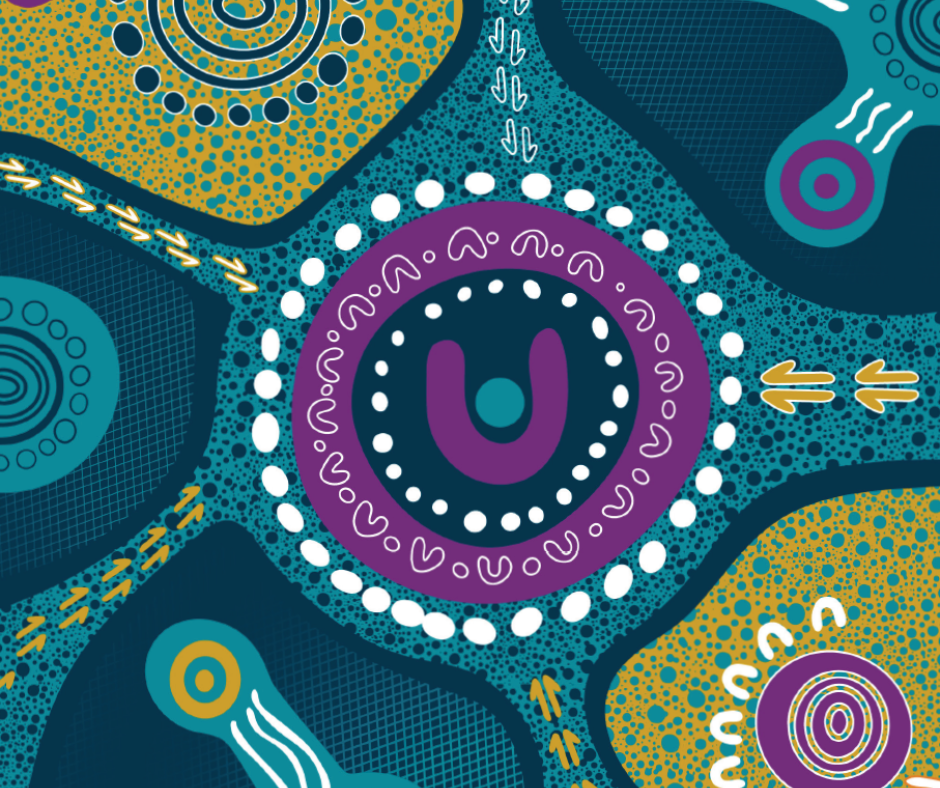Local Health Networks
Local Health Networks (LHNs) manage the delivery of public hospital services as well as community-based health services, determined by the State Government.
LHNs consist of single or groups of public hospitals and sites and have a geographical or functional connection.
South Australia’s LHNs
Under the Health Care Act 2008, there are 10 LHNs in South Australia that have been established as incorporated hospitals.
Local Health Networks with accredited Internship and PGY2 and Beyond positions include:
- Barossa Hills Fleurieu
- Central Adelaide
- Eyre and Far North
- Flinders and Upper North
- Limestone Coast
- Northern Adelaide
- Riverland Mallee Coorong
- Southern Adelaide
- Yorke and Northern
- Women’s and Children’s Health Network
- The Adelaide Prevocational Psychiatry Program (TAPPP)
Click on each of LHN links to view detailed information about their Health Services and Facilities, Educational Opportunities, Supervision and Support, Rotations and Lifestyle.
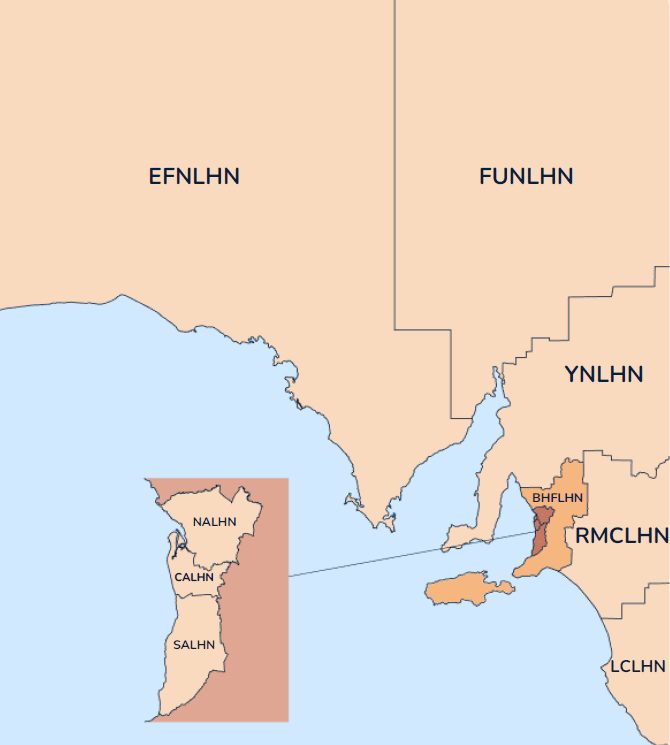
Barossa Hills Fleurieu Local Health Network
View the BHFLHN Video about the B-CET Intern Program
The Barossa Hills Fleurieu LHN offers a broad range of clinical experiences in hospitals and rural and remote primary care settings at Gawler, Tanunda, Angaston, Gumeracha, Mt Pleasant, Kapunda, Mt Barker, Strathalbyn, Littlehampton, Victor Harbor and Kangaroo Island.
Residents have access to a wide range of retail, hospitality, leisure and health care services ranging from larger service hubs within close reach of the CBD, including Mount Barker, through to more remote locations such as Kangaroo Island. Our Local Health Network is adjacent to metropolitan Adelaide, creating a balance of country and metropolitan lifestyle.
Prevocational Medical Officers with BHFLHN receive a three-year contract with the option to extend this under the Single Employer Model (SEM) for Rural Generalist Training in the region.
You will be working as part of a small clinical team and in the process develop close working relationships with many of your colleagues and gain invaluable hands-on clinical experience in a supportive teaching environment.
In line with our values, the working culture at BHFLHN embraces collaboration and all team members are highly valued for the skills and knowledge they are able to contribute to patient care.
-
Health Services and Facilities
Hospitals and health services in the Barossa Hills Fleurieu Local Health Network (BHFLHN) provide support and services to approximately 12% of the South Australian population, encompassing significant population growth in areas such as Mount Barker, Gawler and Victor Harbor. There is a mix of established, and purpose-built infrastructure, and in response to growing populations, there are many exciting ongoing service development projects in the region.
Our services, including 11 public hospitals, 6 aged care facilities and an extensive range of community-based services, are located across Mount Barker, Gawler, Victor Harbor (Southern Fleurieu), Strathalbyn, Kingscote, Mount Pleasant, Angaston, Tanunda, Gumeracha, Eudunda and Kapunda.
BHFLHN delivers a range of clinical services, including:
- emergency medicine
- general medicine and geriatrics
- elective surgery
- anaesthesia
- obstetrics and gynaecology
- aboriginal health
- paediatrics
- specialist services including renal dialysis, chemotherapy and rehabilitation
- community services including allied health, nursing, mental health and palliative care
The Rural and Remote Mental Health Service based in metropolitan Adelaide at Glenside, provides a state-wide mental health service through BHFLHN. Co-located at some of our major sites are the following: Jones Radiology, SA Pathology, SA Pharmacy, Country Health Connect, South Australian Dental Services, Mental Health Services, Drug and Alcohol Services and Rehabilitation Service.
-
Lifestyle
Barossa Hill Fleurieu is adjacent to metropolitan Adelaide, creating a balance of country and metropolitan lifestyle. The region is home to historic towns such as Strathalbyn, Gumeracha and Tanunda and some of the fastest growing areas in the state, including Gawler, Victor Harbor and Mount Barker.
Gifted with stunning coastlines, rolling hills, adventure, and culinary delights the Barossa Hills Fleurieu offers a bit of everything. Whether it’s a tree or sea change, the region can provide farm, forest and bush landscapes or pristine beaches and seaside towns. With plenty of open spaces, a host of popular tourist attractions, parks and beaches, wineries and restaurants together with some of the best craft beers, gin distilleries and local fresh produce – the lifestyle in the Barossa Hills Fleurieu region is truly enviable!
Find out more about the great lifestyle in the Barossa Hills Fleurieu region here.
-
Internship
We extend a warm invitation for you to join our healthcare team and local community in the Barossa Hills Fleurieu Local Health Network (BHFLHN). The Barossa Hills Fleurieu Collaboration for Education and Training (B-CET) program will provide you with a great way to progress your career and provide the skills you will need to pursue whatever pathway you choose in future whether as a hospital-based specialist, general practitioner, rural generalist, or other area of medical practice.
All interns receive a three-year contract with BHFLHN and this may be extended for Rural Generalist Training in the region.
You will begin your internship with a tour of BHFLHN taking time to visiting the health services, meet with staff and getting to know your colleagues. During the orientation week you will have the opportunity to complete two days of ALS2 and Newborn Advanced Life Support Training building confidence as you begin your clinical training years.
Education Opportunities
During the year you will have the opportunity to attend local tutorials, contribute to the fortnightly Clinical Case discussions and participate in the monthly B-CET Skills and Simulation Workshops. You may choose to join the region’s POCUS program allowing you to attend an accredited POCUS workshop and receive individual onsite training during the year in bedside ultrasound supporting you (if you choose) to complete a CCPU qualification in bedside ultrasound.
The BHFLHN is accredited for Certificate and Associateship (intermediate and advanced) training in Emergency Medicine and Associateship (procedural and advanced procedural) training in Obstetrics and has an expanding number of specialist training positions providing rural clinical experience to trainees in tertiary based specialist training pathways including general medicine (BPT), obstetrics, emergency medicine and medical administration.
For trainees wishing to pursue a career as a Rural Generalist or as a General Practitioner, the B-CET program enables them to complete all of their training from internship to advanced skills training through to Fellowship with the Royal Australian College of General Practitioners (RACGP) and Australian College of Rural and Remote Medicine (ACRRM).
Supervision and Support
The Regional Orientation at the commencement of the year together with regular face to face training and regular social activities foster the development of a strong peer to peer network and ensure you are provided with a high level of support during your training. The DCT and MEO meet with trainees face to face each month as part of the B-CET program and are readily available to meet privately to discuss issues or concerns.
For each rotation there is a Term Supervisor who will orientate you when you begin and will be working alongside you during the rotation. Your Term Supervisor will provide feedback during the rotation and complete your mid and end-of-term formative assessments. You will also work with a range of other senior clinicians and consultants who will act as your clinical supervisors providing you with continuing support, supervision and teaching during the attachment.
All SA Health employees have access to the Employee Assistance Program as an additional source for confidential counselling and support.
Rotations
Interns undertake 4 x 3 month rotations in Emergency Medicine, Medicine, General Practice and a Periprocedural rotation in either Anaesthesia/Surgery or Obstetrics/Gynaecology. Interns are rostered to work weekdays and weekends but are not rostered to do night shifts or take on the role of reliever.
In your second and subsequent years in the region you will be able to obtain a wide range of clinical experience in general medicine, primary care, anaesthesia, obstetrics and gynaecology, aboriginal health, paediatrics, palliative care, geriatrics, mental health and medical education.
-
PGY2+
You will be working as part of a small clinical team and in the process develop close working relationships with many of your colleagues and gain invaluable hands-on clinical experience in a supportive teaching environment.
Education Opportunities
In line with our values, the working culture at BHFLHN embraces collaboration and all team members are highly valued for the skills and knowledge they are able to contribute to patient care.
An orientation at the commencement of your training in BHFLHN allows you to meet other trainees, find out more about the region and its health services and explores many of the challenges that you may face as part of PGY2+ training.
During your training you will have the opportunity to attend local tutorials, contribute to the fortnightly Clinical Case discussions and participate in the monthly B-CET Skills and Simulation Workshops. You may choose to join the region’s POCUS program allowing you to attend an accredited POCUS workshop and receive regular individual onsite training in bedside ultrasound that will allow you to complete a CCPU qualification in bedside ultrasound.
PGY2+ trainees may undertake rotations in a range clinical areas including emergency medicine, internal medicine, anaesthesia, primary care, dermatology, paediatrics, obstetrics and gynaecology.
During the year trainees are generally based at one of three sites in the region (Gawler/Barossa, Mt Barker/Strathalbyn, and Victor Harbor) but may select to work at another site for 3 or more months to increase their range of experience and choice of rotations.
The BHFLHN is accredited for Certificate and Associateship (intermediate and advanced) training in Emergency Medicine and Associateship (procedural and advanced procedural) training in Obstetrics and has an expanding number of specialist training positions providing rural clinical experience to trainees in tertiary based specialist training pathways including general medicine (BPT), obstetrics, emergency medicine and medical administration.
For trainees wishing to pursue a career as a Rural Generalist or as a General Practitioner, the B-CET program enables them to complete all of their training from internship to advanced skills training through to Fellowship with the Royal Australian College of General Practitioners (RACGP) and Australian College of Rural and Remote Medicine (ACRRM).
Supervision and Support
The Regional orientation at the commencement of the year together with regular face to face training and regular social activities foster the development of a strong peer to peer network and ensure you are provided with a high level of support during your training. The DCT and MEO meet with trainees face to face each month as part of the B-CET program and are readily available to meet privately to discuss issues or concerns.
For each rotation there is a Term Supervisor who will orientate you when you begin and will be working alongside you during the rotation. Your Term Supervisor will provide feedback during the rotation and complete your mid and end-of-term formative assessments. You will also work with a range of other senior clinicians and consultants who will act as your clinical supervisors providing you with continuing support, supervision and teaching during the attachment.
All SA Health employees have access to the Employee Assistance Program as an additional source for confidential counselling and support.
Find out more about BHFLHN services and how to access them below:
 Victor Harbor Hospital
Victor Harbor Hospital
Central Adelaide Local Health Network
View the CALHN Video on Medical Intern Recruitment
Central Adelaide Local Health Network (CALHN) provides acute and community services to central metropolitan Adelaide and tertiary services to a wider catchment area. Hospitals and services within the CALHN include the Royal Adelaide Hospital, The Queen Elizabeth Hospital, Glenside Hospital, Hampstead Rehabilitation Centre, a range of sub-acute and primary health care services and several state-wide services.
CALHN serves the South Australian community through a multidisciplinary patient-focused model, delivering comprehensive medical services and care to manage a diverse range of complex health issues. CALHN is committed to our community through a partnership approach in delivering healthcare that promotes wellness through illness prevention and proactive treatment of disease.
CALHN provides a broad base of clinical experience and has a demonstrated culture of expert teaching and training which is very well supported by senior clinicians and trainees.
CALHN is an accredited prevocational (PGY1 and PGY2+) medical training provider. The hospitals to which interns are allocated as home-based hospitals are The Queen Elizabeth Hospital and the Royal Adelaide Hospital.
-
Health Services and Facilities
The Royal Adelaide Hospital is an 800-bed Hospital providing a comprehensive range of the most complex clinical care to an estimated 85,000 inpatients and 400,000 outpatients each year. Structurally, the hospital spans the equivalent of three city blocks and is located on a site containing almost four hectares of landscaped parks and internal green space, including over 70 courtyards, terraces and sky gardens.
The RAH is located in the Northwest corner of the Adelaide CBD and is accessible by various bus, tram and train routes. There is a staff car park onsite and a parking permit can be applied for with consideration given to the full-time shift-working workforce.
The Queen Elizabeth Hospital (TQEH) is a 355 bed, acute and sub-acute teaching hospital that provides inpatient, outpatient, emergency and mental health services to a population of more than 250,000 people living primarily in Adelaide’s western suburbs.
TQEH Medical Education Unit oversees rotations based at TQEH as well as CALHN intern rotations at various offsite locations such as Glenside Hospital, Rural GP practices (Jamestown, Port Lincoln and Waikerie), Port Augusta Hospital (General Surgery) and Emergency Department at Women’s and Children’s Hospital.
Kangkanthi, pronounced ‘gun-gun-dee’, is a Kaurna word meaning ‘to care’, is the new 5-level clinical services building at TQEH, open on 3 July 2024.
The Kangkanthi building includes the following services:
- a 46 bay emergency department (ED)
- SA Medical Imaging department
- a 14 bed Intensive Care Unit (ICU), including a simulation laboratory
- 12 operating theatres including pre-operative and recovery spaces
- 4 procedure rooms and a cardiac catheterisation laboratory
- 52 inpatient beds for general rehabilitation including therapy and gym facilities
- Central Sterilising Services Department
- SA Pathology Laboratory
TQEH is situated in Adelaide’s western suburbs, 20 minutes from the CBD. It is well-connected by public transport, with regular bus services operating along Port Road, stopping directly outside the hospital on Woodville Road and train access via Woodville Railway Station. A multi-deck staff car park is located on the hospital grounds.
-
Internship
Education opportunities
Royal Adelaide Hospital and The Queen Elizabeth Hospital
- Weekly Intern teaching – protected training time
- This program provides ongoing educational and training opportunities in response to the changing needs of interns as they progress through their clinical rotations. These are practical, case-based discussions guiding interns on how to solve problems that they can expect to experience in their daily practice.
- MDT MER simulation training
- Ward bedside teaching and MDT meetings
- Intern simulation training
- ECG Masterclasses
- Career development workshops
- Weekly Surgical Unit intern teaching (for interns undertaking Surgical terms)
- Weekly Emergency Department teaching (for interns undertaking an Emergency Medicine term)
- Weekly General Medicine teaching (for interns undertaking General Medicine terms)
- Ward rounds and individual teaching meetings
- Weekly Medical Grand Rounds
Surgical Grand Rounds - Clinical Teacher Development Training
- Adult Advanced Life Support Training (ALS1 & ALS2)
- Clinical Skills Twilight Sessions
- Near-Peer Mentorship Program
supervision and support
Each rotation has a specific Term Description document which outlines the supervision arrangements for the rotation. These documents are available to the intern before commencement of the term. Supervision may be provided by varied personnel i.e. RMO/Registrar, Consultant and Term Supervisor. Interns are encouraged to read and understand the term description prior to the term commencing. A unit orientation document is completed by the Term Supervisor and the Intern ensuring a comprehensive orientation to the unit is completed. The DCT and MEO are always available to provide support and guidance as needed. A near-peer mentorship program is also now in its 9th year at TQEH which provides those interns interested in this form of support a mentor for the year in the form of a PGY2+.
Interns may receive support from many and varied personnel, and this is well outlined during the orientation program i.e.:
- DCT – Director of Clinical Training
- MEO – Medical Education Officer
- Term Supervisors
- PMO Unit
- Senior medical colleagues
- Medical Education Registrar
- AMA
- SASMOA
- SA MET PMO Forum
- CALHN PMO Forum
- Intern Reps – Advocates, General Clinical Training Committee, Medical Education Committee, After-Hours Committee
- Interviews with DCT and MEO
- Medical Education Unit Office open door policy
- Doctors Health SA
- Employee Assistance Program
- Chief Medical Residents
Rotations
Interns are asked to preference rotations as well as provide their leave preferences prior to the commencement of the clinical year. The DCTs, MEOs and PMO Unit assign the rotations taking into consideration individual preferences, leave requirements/requests and organisational requirements. Some interns will undertake Nights or Relieving terms. Rotations will be allocated to ensure compliance with the AMC Framework.
When all rotation allocations have been determined, the site where the majority of terms (i.e. 3 out of 5) will take place and coinciding Term 1 allocation (in most cases) determines the home-base hospital. All efforts are made to have Interns commence their internship within their home hospital.
The individual unit Term Description document outlines the required rostered working hours – this is variable to each unit with a minimum of 76 hours per fortnight.
The PMO unit manages annual leave and other leave requirements. It is required that interns take 3 weeks annual leave throughout the year and the final two weeks of annual leave are allocated at the end of internship and before commencement of the PGY2 year.
TQEH Rotations RAH Rotations Acute Medical Unit Acute Mental Health Breast and Endocrine Acute Stroke Cardiology Cardiology Emergency Medicine Colorectal Surgery Gastroenterology Emergency Medicine General Medicine ENT Surgery General Rehabilitation Gastroenterology Geriatric Medicine (Aged Care) General Medicine Geriatric Rehabilitation Geriatric Medicine Nights Hepatobiliary Surgery Orthopaedic Surgery Neurology – including Subacute Stroke Palliative Care Nights Plastic Surgery Orthopaedic Surgery Psychiatry Plastic Surgery Psycho-Geriatric Radiation Oncology Relieving Relieving Respiratory Thoracic Medicine Upper GI Trauma Surgery & Surgical Oncology Urology Upper GI Surgery Vascular Surgery Offside Rotations managed by TQEH Medical Education Unit Drug and Alcohol Services SA (DASSA), Glenside Hospital Emergency Department, Women’s and Children’s Hospital General Surgery, Port Augusta Hospital Rural & Remote Psychiatry, Glenside Hospital Rural General Practice (Jamestown, Port Lincoln & Waikerie) - Weekly Intern teaching – protected training time
-
PGY2+
education opportunities
PGY2+ General Trainee (GT) Program and Surgical Resident Medical Officer Program educational opportunities are integrated across all CALHN sites.
General Trainee Program Educational Opportunities
- GT Education Training Program – fortnightly one hour education sessions aimed to provide ongoing educational and training opportunities valuable for professional development and career progression. TQEH onsite Pager protected time
- Specialty workshops with targeted educational focus involving theory and practical skills
- Medical Emergency Response (MER/MET) and Code Blue Simulation Training – Multidisciplinary sessions with simulation, case discussions and debriefs (for GTs undertaking General Medicine terms at TQEH)
- The program curriculum is linked to the National Framework for Prevocational (PGY1 & PGY2) Medical Training and the National Safety & Quality Health Service (NSQHS) Standards
- Emergency Medicine teaching
- Clinical teaching and MDT meetings
- Supported Professional Development
- Supported Adult Advanced Life Support Training
- Career development support and GT Program Meetings
- Journal clubs
- Unit-based Research Opportunities
- Near-Peer mentoring program – TQEH
- Medical Grand Rounds
- General Medicine Grand Rounds
- CALHN Medical Education Committee (MEC), the RAH Medical Education & Training Committee (METC) and TQEH General Clinical Training Committee (GCTC) membership opportunities
Surgical Resident Medical Officer Program Educational Opportunities
- Surgical Education Training Program – series of workshops aimed to provide ongoing educational and training opportunities valuable for professional development and career progression
- Specialty workshops with targeted educational focus involving theory and practical skills
- Surgical Peer Educator Opportunities
- The program curriculum is linked to the National Framework for Prevocational (PGY1 & PGY2) Medical Training and the National Safety & Quality Health Service (NSQHS) Standards
- Emergency Medicine teaching
- Clinical teaching and MDT meetings
- Unit-based Research Opportunities
- Supported Adult Advanced Life Support Training
- Career development support and Surgical Program Meetings
- Journal clubs
- Near-Peer mentoring program – TQEH
- Surgical Grand Rounds
- Supported Professional Development
- CALHN Medical Education Committee (MEC), the RAH Medical Education & Training Committee (METC) and TQEH General Clinical Training Committee (GCTC) membership opportunities.
Supervision and support
Each PGY2+ rotation has a specific Term Description, which outlines the unit-based supervision for the rotation. These documents are available to the PGY2+ before commencement of the term. Supervision may be provided by varied personnel i.e. RMO/Registrar, Consultant and Term Supervisor. PGY2+ doctors are encouraged to read and understand the term description prior to the term commencing. A unit orientation document is completed by the Term Supervisor and the PGY2+, ensuring a comprehensive orientation to the unit is completed. Both the RAH and TQEH Medical Education Units have an open-door policy and the DCT and MEO are always available to provide support and guidance as needed.
PMOs may receive support from many and varied personnel, including (but not limited to):
- DCT – Director of Clinical Training
- MEO – Medical Education Officer
- Term Supervisors
- PMO Unit
- Senior medical colleagues
- Medical Education Registrar
- SA MET PMO Forum
- CALHN PMO Forum
- PMO Reps – Advocates, General Clinical Training Committee, Medical Education Committee, After-Hours Committee
- Interviews with DCT and MEO
- Doctors Health SA
- Employee Assistance Program
Chief Medical Residents - AMA
- SASMOA
rotations
PGY2+ General Trainee (GT) Program and Surgical Resident Medical Officer Program rotations are integrated across all CALHN sites. The two major CALHN hospitals; The Royal Adelaide Hospital (RAH) and The Queen Elizabeth Hospital (TQEH), offer a dynamic range of rotations, including:
- The Royal Adelaide Hospital (RAH)
- The Queen Elizabeth Hospital (TQEH)
- Women’s and Children’s Health Network (WCHN)
- Hampstead Rehabilitation Centre (HRC)
- Repat Health Precinct (RHP)
- Glenside Health Services
- Western Community
- Radiation Oncology Darwin
- Adelaide Sexual Health Centre
PMOs are offered rotation preferences and leave preferences in support of Career Development and National Framework Standards.
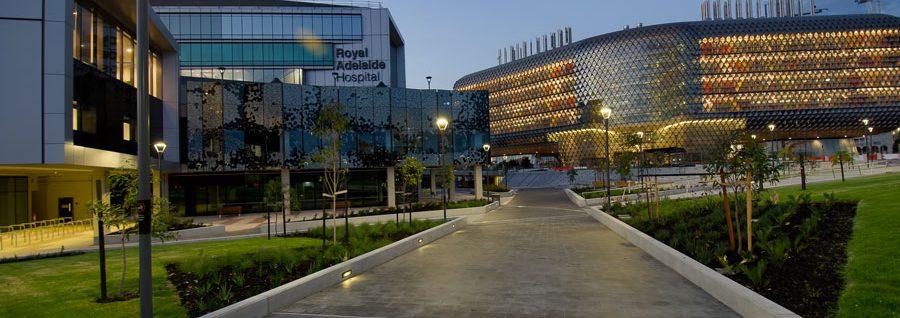 Royal Adelaide Hospital
Royal Adelaide Hospital
Eyre and Far North Local Health Network
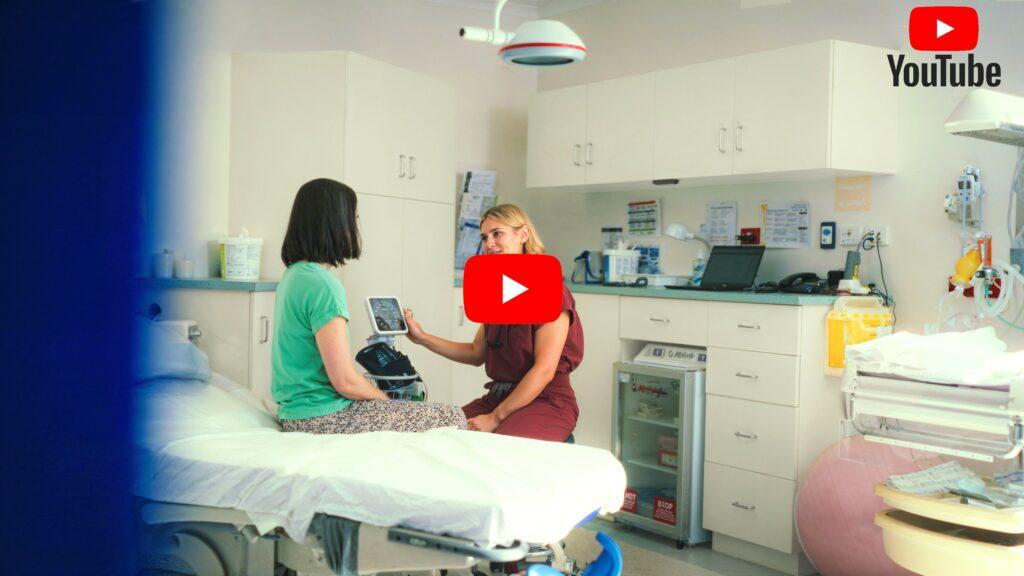 View the EFNLHN Video on ‘Every day is an adventure of Abby’.
View the EFNLHN Video on ‘Every day is an adventure of Abby’.
The Eyre and Far North Local Health Network (EFNLHN) offers doctors in training the work-life balance you’re looking for without compromising on career opportunities.
The Eyre Peninsula and Far North is a beautiful part of the world with breathtaking coastlines, pristine beaches, and friendly, vibrant local communities, where you will have access to a wide range of clinical experiences in regional hospitals and local medical practices.
-
Health Services and Facilities
Port Lincoln Hospital
Port Lincoln Hospital is the largest hospital in the Eyre and Far North and provides a base for medical services within the region. The 48-bed facility provides a range of services including a 24-hour Emergency Department, Special Care Unit, renal dialysis, medium-level chemotherapy, maternity and birthing service, operating facilities, paediatrics clinic, palliative care service, allied health services, pharmacy and dental. Community health services operate from the hospital under the banner of Community Health Connect, providing an extensive range of services for the community.
The Medical Education Unit is based at the hospital and offers a clinical simulation facility for training and education.
Associated Practices
- Boston Bay Family Health Practice
- Lincoln Medical Centre
- Investigator Clinic
- Port Lincoln Aboriginal Health Service
Ceduna District Health Services
- The Ceduna Hospital has 15 acute inpatient beds, 2 dialysis chairs and 38 high- and low-level aged care beds.
- Services include emergency, surgical, general medicine, obstetrics, renal dialysis, diagnostic radiology and outpatients.
- The residential aged care service is provided within the hospital at the Kuhlmann Wing and Ceduna Senior Citizens village. Located adjacent to the GP family practice, the hospital works collaboratively to provide their patients with the best quality care.
- The Ceduna region offers an ideal training environment for individuals interested in Aboriginal Health, with 24% of the population identifying as Aboriginal.
Cummins District and Memorial Hospital
The Cummins Hospital has 12 acute inpatient beds and 8 aged care beds.
Services include emergency, general medicine, surgical care, day surgery, palliative care, and outpatients. Community and Allied Health Services are based on the hospital grounds.
The Miroma Place Hostel is separate from the hospital but conveniently located next door and provides a home-like setting for people with low levels of care.
Tumby Bay Hospital and Lower Eyre Health Service
Tumby Bay Hospital has 16 acute inpatient beds and 22 aged care beds including the Uringa Hostel located next door.
Services include emergency, general medicine, and outpatients.
-
Lifestyle
The Eyre Peninsula and Far North is a beautiful part of the world offering breathtaking coastlines, pristine beaches, and friendly, vibrant local communities. The region is renowned for seafood and surfing and is home to shark cage diving.
With award-winning restaurants, and the ability to experience the food journey from paddock (or ocean) to plate, it’s a great place to eat and relax. It’s also a good place to take a tour, snorkel with sea lions, swim with dolphins, paddleboard, fish or hike. Visit koalas and kangaroos or take a 4WD tour through the Port Lincoln and Coffin Bay National Parks.
Port Lincoln has a strong sporting culture, with multiple ovals, sporting clubs, indoor swimming, and recreation centres.
Port Lincoln regularly ranks among the most welcoming cities in Australia.
Learn more about the regional lifestyle.

-
Internship
Educational opportunities
Prevocational Medical Officers in the Eyre Far North are able to obtain a wide range of clinical experience in general practice, emergency, medical inpatients, anaesthetics, obstetrics and Aboriginal Health while working in the region. Part of their learning includes weekly tutorials covering a range of essential medical skills and knowledge.
In addition to term rotations, trainees have access to a state-of-the-art simulation facility including SimMan 3G Plus and SimNewbie. The high-fidelity simulation equipment allows you to practise skills in neonatal care and advanced life support in a life-like but less threatening space. Multidisciplinary sessions are facilitated throughout the year to simulate the Emergency Department environment.
EFNLHN and the Flinders and Upper North LHN (FUNLHN) collaborate four times ayear for joint simulation sessions, allowing for networking and team building.
Rural Generalist Program South Australia (RGPSA) provides an annual simulation day with all the regional prevocational doctors across the regions.
The EFNLHN Medical Education Team is committed to supporting training and education for regional clinicians. We encourage and support prevocational doctors attending workshops hosted in our region and beyond.
supervision and support
Each term rotation is supervised by a term supervisor, responsible for the orientation and training of the trainee. Supervisors provide continual feedback throughout the rotation and complete mid and end-of-term formative assessments as required. During rotations, trainees work with a range of clinicians, locums and consultants providing additional support, supervision and teaching.
The Medical Education Unit based in the Port Lincoln Hospital provides further support throughout the training year. Director of Clinical Training Dr Alison Lydeamore, Medical Education Officer Kaylee Brown, and Medical Administration Officer Ellie Jessop will facilitate orientation, accommodation, career guidance, counselling and simulation bookings during the training year.
As an SA Health employees you will also have access to the Employee Assistance Program as a source of confidential counselling and support.
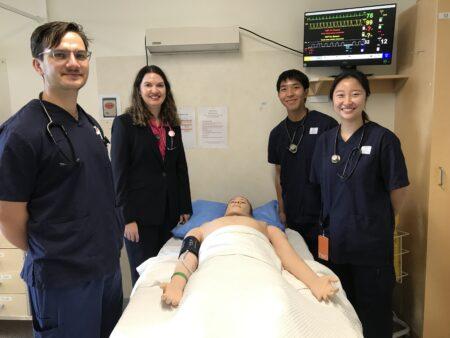
Rotations
The Eyre Far North Local Health Network has accredited terms for Prevocational Medical Officers in:
Port Lincoln Hospital
- Emergency
- Medical Inpatients
- General Surgery
- General Practice and Obstetrics (Lincoln Medical Centre)
- General Practice and Anaesthetics (Lincoln Medical Centre)
- Rural Generalism – General Practice, Emergency and Aged Care (Investigator Clinic)
Ceduna Hospital
- Rural Generalism
Cummins Hospital and Lower Eyre Family Practice
- General Practice and Emergency
Tumby Bay Hospital and Tumby Bay Medical Clinic
- Rural Generalism
Interns are rostered to predominantly 5-day rosters with occasional weekend work dependent on rotations. Overtime is strictly limited to ensure an appropriate work-life balance while rostering remains flexible. Throughout rotations, opportunities may arise out of hours, and Interns are expected to discuss changes in work schedules with their allocated term supervisor.
-
PGY2+
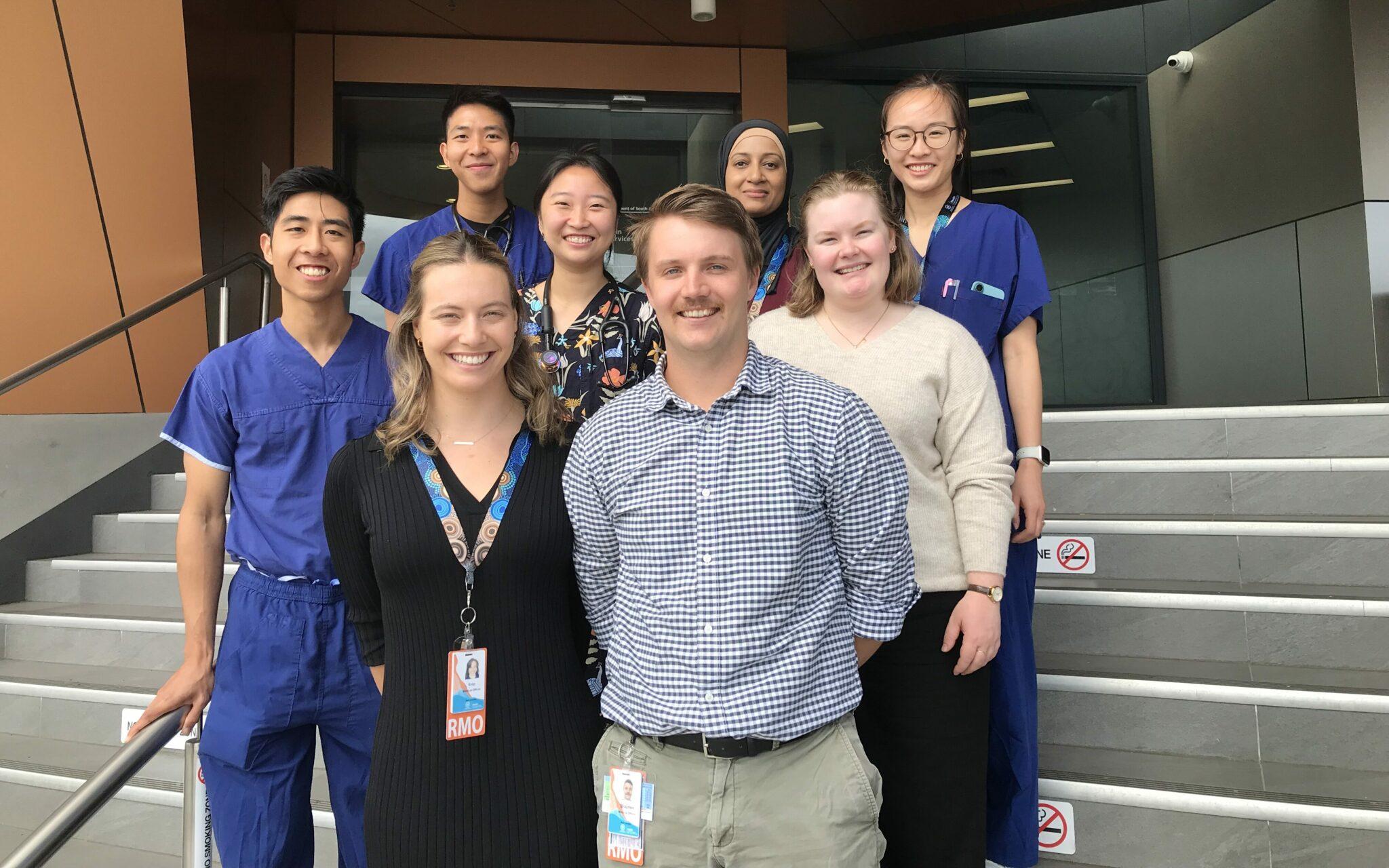
EFNLHN 2025 Postgraduate Doctors
Educational opportunities
Prevocational Medical Officers in the Eyre Far North are able to obtain a wide range of clinical experience in general practice, emergency, medical inpatients, anaesthetics, obstetrics, radiology exposure and Aboriginal Health while working in the region. Part of their learning includes weekly tutorials covering a range of essential medical skills and knowledge.
In addition to term rotations, trainees have access to a state-of-the-art simulation facility including SimMan 3G Plus and SimNewbie. The high-fidelity simulation equipment allows you to practise skills in neonatal care and advanced life support in a life-like but less threatening space. Multidisciplinary sessions are facilitated throughout the year to simulate the Emergency Department environment.
EFNLHN and FUNLHN collaborate four times a year for joint simulation sessions, allowing for networking and team building.
Rural Generalist Program South Australia (RGPSA) offers an annual simulation day with all the regional prevocational doctors across the regions.
The EFNLHN Medical Education Team is committed to supporting training and education for regional clinicians. We encourage and support prevocational doctors attending workshops in our region and beyond.
Supervision and support
Each term rotation is supervised by a term supervisor, responsible for the orientation and training of the trainee. Supervisors provide continual feedback throughout the rotation and complete mid and end-of-term formative assessments as required. During rotations, trainees work with a range of clinicians, locums, and consultants providing additional support, supervision, and teaching.
The Medical Education Unit based in the Port Lincoln Hospital provides further support throughout the training year. Director of Clinical Training Dr Alison Lydeamore, Medical Education Officer Kaylee Brown, and Medical Administration Officer Ellie Jessop will facilitate orientation, accommodation, career guidance, counselling, and simulation bookings during the training year.
As an SA Health employee you have access to the Employee Assistance Program as a source of confidential counselling and support if needed.
rotations
The Eyre Far North Local Health Network has accredited terms for Trainee Medical Officers in:
Port Lincoln Hospital
- Emergency
- Medical Inpatients
- General Surgery
- General Practice and Obstetrics (Boston Bay Family Health Practice)
- General Practice and Anaesthetics (Boston Bay Family Health Practice)
- Rural Generalism – General Practice, Emergency and Aged Care (Investigator Clinic)
- Aboriginal Health (Port Lincoln Aboriginal Health Service)
- Emergency/ Radiology
Ceduna Hospital
- Rural Generalism
Cummins Hospital and Lower Eyre Family Practice
- General Practice and Emergency
Tumby Bay Medical Clinic and Tumby Bay Hospital and Lower Eyre Health Service
- Rural Generalism
RMOs are rostered to predominantly 5-day rosters with occasional weekend work dependent on rotations. Overtime is strictly limited to ensure an appropriate work-life balance while rostering remains flexible. Throughout rotations, opportunities may arise out of hours, and RMOs are expected to discuss changes in work schedules with their allocated term supervisor.
Find out more about EFNLHN services and how to access them:
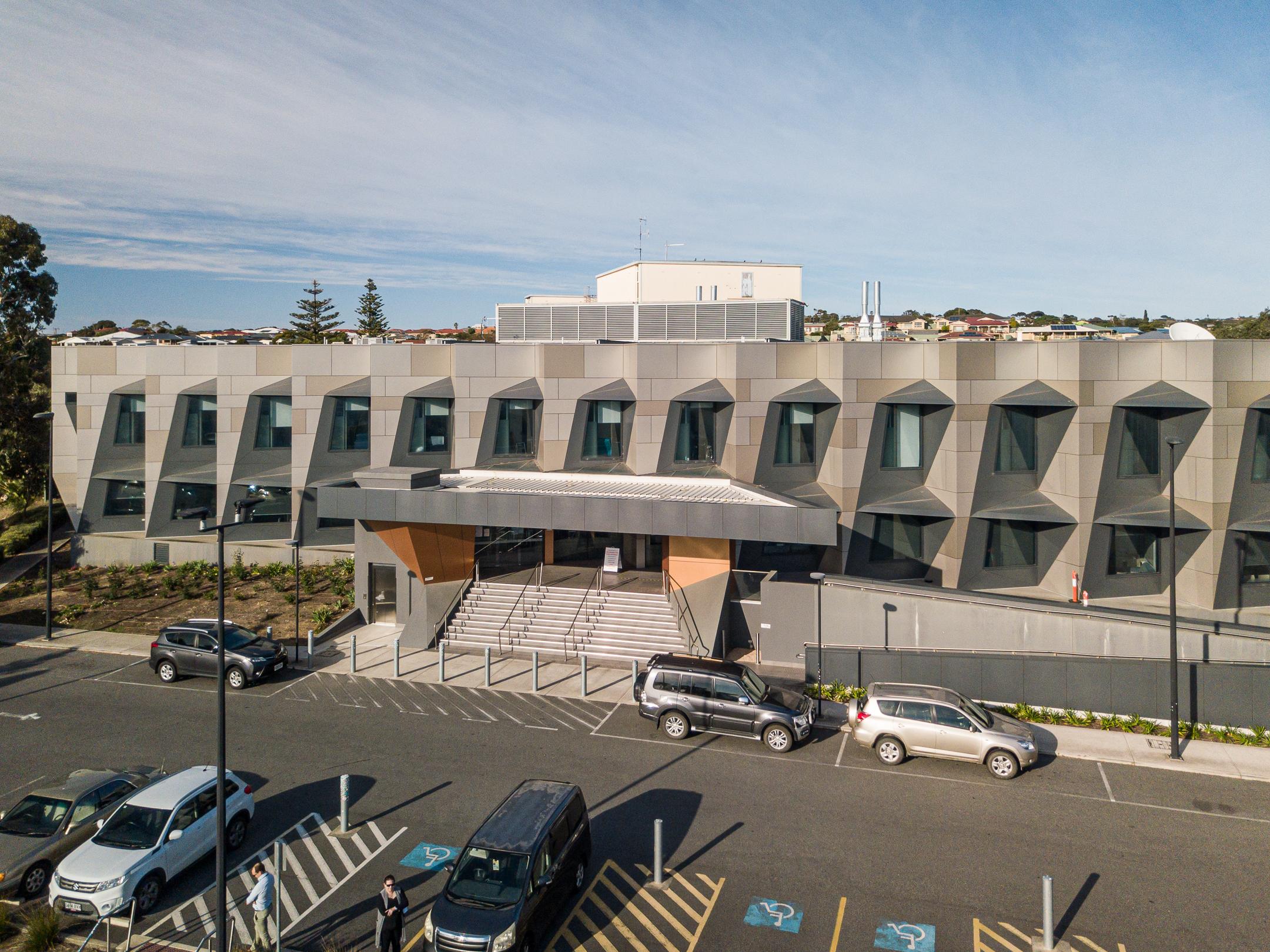 Port Lincoln Health and Hospital Service
Port Lincoln Health and Hospital Service
Flinders and Upper North Local Health Network
View the FUNLHN Video on ‘Experience the FUNLHN Junior Doctors Program‘.
The Flinders and Upper North Local Health Network (FUNLHN) is part of SA Health and provides care for around 45,000 people living north from the Spencer Gulf to the Northern Territory, including the communities of Hawker, Leigh Creek, Port Augusta, Roxby Downs, Quorn and Whyalla. Residents across the Flinders and Upper North Local Health Network have access to a wide range of health care services in a various number of locations throughout the regions. This includes Port Augusta Hospital and the Royal Flying Doctor Service, Whyalla Hospital and Health Service and a community based general practice.
The Flinders and Upper North Local Health Network oversees the public hospitals and health services in the following regions across rural South Australia:
- Port Augusta Hospital
- Whyalla Hospital and Health Service
- Hawker Memorial Hospital
- Quorn Health Service
- Roxby Downs Health Service
-
Health Services and Facilities
Port Augusta Hospital (PAH)
The Port Augusta Hospital is a large country hospital, providing a wide range of inpatient, outpatient and outreach services. The hospital has 55 overnight stay inpatient beds, including five monitored beds. It also includes five low-risk chemotherapy chairs and 12 Renal Dialysis chairs. Port Augusta Hospital has a level 4 obstetric facility, where more complex patients are referred from other facilities.
Port Augusta Hospital provides 24 hours a day, seven days a week (24/7) accident and emergency service, acute inpatient care, maternal and neonatal services, elective surgery, palliative, low-risk chemotherapy, renal dialysis and stepdown facilities for Aboriginal and out-of-town patients. Additional services located onsite are radiology, SA Pathology, clinical pharmacists and Allied Health Services. Hospital services are co-located with community health services.
Port Augusta Hospital is a teaching hospital with Prevocational Medical Officers (general RMOs, Paediatric medicine, general surgery, Diploma of O&G (advanced) and a surgical intern) and Adelaide University Rural medical students spending their full fifth year based in Port Augusta.
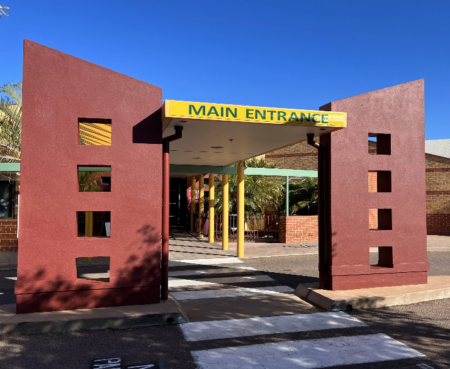
Royal Flying Doctor Service (RFDS)
The RFDS clinic is available to all residents living, working and travelling in remote South Australia, including districts of the Flinders Ranges, Gawler Ranges, Birsdville Track and Far North, and the communities of Yalata and Oak Valley. Operating from the RFDS Port Augusta Base, the RFDS Primary health Care Service offers remote patients a complete range of primary health care services. Interns may attend retrievals and community visits during this rotation.
Whyalla Hospital Health Service (WHHS)
Whyalla Hospital and Health Service is a large country hospital, providing a wide range of services of inpatient, outpatient and outreach services. The hospital has 75 multi-day in-patient beds, including an eight-bed high dependency unit, six renal chairs, six moderate risk chemotherapy chairs, 21 same-day recovery beds, two operating and one endoscopy theatre and nine emergency department bays. Whyalla Hospital and Health Service is a level 3 obstetric facility. More complex patients are referred to the level 4 facility at Port Augusta.
Whyalla Hospital provides 24 hours a day, seven days a week (24/7) accident and emergency services, acute inpatient care, maternal and neonatal services, elective surgery, renal dialysis, acute stroke, palliative, rehabilitation and orthotics/prosthetics service. There is a regional Cancer Centre providing medium risk chemotherapy and an integrated mental health inpatient unit onsite with specialist oncologist and resident psychiatrist. Additional services located onsite are radiology (including MRI), SA Pathology, clinical pharmacy and Allied Health Services.
Whyalla Hospital and Health Service is a teaching hospital with Prevocational Medical Officers (adult medicine, general surgery, psychiatry, general RMOs and interns) and Adelaide University Rural medical students spending their full fifth year in Whyalla.

-
Lifestyle
Port Augusta:
Port Augusta is located 310 km north of Adelaide at the top of the Spencer Gulf. Port Augusta is a small city known as the crossroads because the Stuart Highway heads north to Alice Springs and Darwin, the Eyre Highway heads west to the Nullarbor and the Eyre Peninsula and the Princes Highway to the south leads to Adelaide. Port Augusta is also the gateway to the North and Central Flinders Ranges. Port Augusta has a various number of attractions which are enjoyed by residents and visitors whether fishing, sailing, hiking or visiting the city art galleries. With vivid scenery, small town charm, and distinctive mystic outback landscapes, there is a wide selection of year-round activities to discover.
The benefits of being on the Spencer Gulf is discovering rich Aboriginal heritage. Port Augusta is a small city with a diverse culture. Port Augusta has plenty of shopping opportunities, as well as sporting facilities such as the public swimming pool, golf course, bowling green and a state-of-the-art football oval. You can walk along sandy beaches or in leafy gardens, watch a movie, swim, shop or socialize in a café or bar. Live an enviable lifestyle with natural wonders, spectacular vista and beaches, unique one-of-a-kind experiences and great services.
With open spaces, wind and ocean make for many sports and activities. Unearth the Flinders Ranges, Australian Arid Lands Botanic Gardens, Pichi Richi Railway or walk along the Port Augusta’s scenic coastline on the coastal walk.

Whyalla:
Whyalla is an important hub located on Eyre Peninsula’s Spencer Gulf in South Australia and is the region’s biggest city for retail shopping with excellent recreational, sporting and entertainment facilities. Whyalla boasts a warm climate, accessible ocean shores and saltwater fishing. Whyalla represents South Australia’s foremost combination of industrial and nature-based experiences. With vivid scenery, small city charm, distinctive mystic outback landscapes and year-round things to do, Whyalla offers discovery, unique Australian natural wonders and absolute contrast in nature based and industrial activities. Activities that are significant to the landscape and geography of the region that will enthral and gratify those looking to unearth and experience learning, adventure time and witness unrivalled sights and happenings.
Dive or snorkel and witness the camouflage and colourful mating rituals of Whyalla’s distinctive Giant Cuttlefish. Relax within the ocean and wonders of the unique Northern Coastline and beaches on the tranquil Spencer Gulf which are back dropped by the ancient Southern Flinders Ranges. Spectacular sunsets and shimmering horizons, unrivalled natural events and industry that strengthen the nation await the adventurous ready to unearth our earth’s raw essence up close.

-
Internship
We invite you to complete your internship at the Flinders and Upper North Local Health Network based across Flinders and Upper North Local Health Network (FUNLHN) where an internship will set you up well for a rural generalist career with the potential to continue your PGY2+ years in a rural setting. This rural immersion intern experience will provide you with broad experiences across diverse clinical areas including emergency medicine, general medicine, general surgery and general practice. You will have opportunities to work with experienced healthcare teams under the personalised supervision of experienced rural clinicians, challenge yourself to gain valuable experience with hands-on procedural skills, and have access to learning opportunities including weekly junior doctor tutorials, simulation sessions, Journal Club and Grand Rounds.
Being a member of a small cohort of interns you will be able to embrace close working relationships with your junior and senior medical colleagues. The working culture within the Flinders and Upper North embraces teamwork and all team members are highly valued for the skills and knowledge they are able to contribute to patient care.
We invite you to become a valued member of the healthcare team in addition to the local communities in Port Augusta and Whyalla. This internship will set you up well for a rural generalist career and link into further opportunities in rural or specialist postgraduate training and work in Adelaide or rural locations.
Learn more about the regional lifestyle.
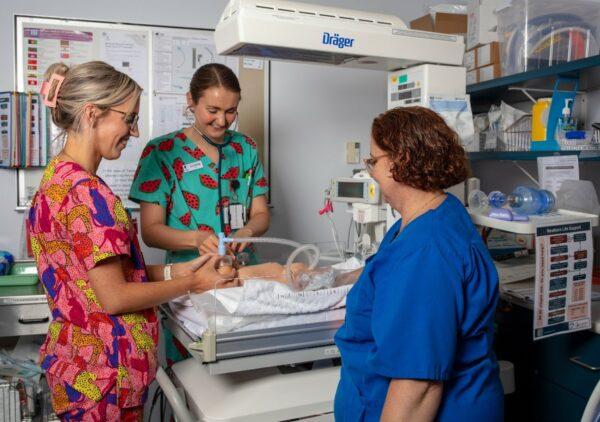
Educational opportunities
Flinders and Upper North Local Health Network
The rural intern training program within the Flinders and Upper North Local Health Network (LHN) provides high-quality, AMC-accredited training across multiple clinical sites. Interns gain experience in a variety of disciplines, ensuring a well-rounded foundation for their medical careers.
To support learning, interns participate in weekly tutorials and scheduled simulation sessions, which are based in Whyalla and Port Augusta. While tutorials can be attended in person or via Teams, simulation sessions are mandatory and must be attended in person.
supervision and support
Flinders and Upper North Local Health Network
There is a nominated supervisor for each rotation who will meet with junior doctors individually to provide feedback and conduct mid and end-of-term assessments. Supervisors are encouraged to give regular feedback to their junior doctors on a day-to-day basis and are given training and support to be able to provide this.
The Medical Education Unit maintains an open-door policy, allowing junior doctors to seek support at any time via drop-in visits, phone, Teams, or email. Additionally, the Director of Clinical Training (DCT) and Medical Education Officer (MEO) coordinate confidential mid-rotation appraisals, offering a structured opportunity to:
- Request support or advice.
- Raise concerns.
- Discuss career pathways.
- Provide feedback on the training program.
Support for interns relocating to the region is provided by the Flinders and Upper North LHN Medical Education Unit based in Whyalla. Interns are provided with free accommodation at each site for the duration of each rotation ensuring they have a comfortable, safe and accessible place to stay.
rotations
Flinders and Upper North Local Health Network
Flinders and Upper North Local Health Network have accredited terms for Interns in core and non-core rotations:
- Emergency Medicine / Royal Flying Doctors Service (RFDS) – based at Port Augusta
- General Surgery – Whyalla Hospital
- General Medicine – Whyalla Hospital
- General Practice – based at Bunyarra Clinic (Whyalla)
- Mental Health Inpatient Unit – Whyalla Hospital
The Medical Education Unit is responsible for orientation and coordination of the education program for junior doctors. The Medical Administration teams are responsible for rostering and ensuring that trainees are rostered in line with the EBA standard.
Interns are rostered to work 76 hours per fortnight including weekends, with no requirement for night shifts in the intern year. There is a TMO on call roster which you will participate to gain exposure to Obstetric and Emergency Surgical cases. The hours are monitored carefully to ensure safe working hours.
All hospitals are located approximately 1 km from the city centres with free secure staff parking available onsite. Some type of private transport is required as the cities are spread over quite a large area. Most locations are only 3–8 minutes away by car, 10–15 by bicycle. There are limited public transport systems in all locations.
This is an exciting opportunity in an established intern program which is planned for junior doctors to work, live and train across an enviable blend of medical, surgical, emergency, rural medicine and general practice. You will be awed by the dramatic events and vivid colours and textures that shapes the Spencer Gulf communities of South Australia.
-
PGY2+
educational opportunities
Prevocational Medical Officers in the Flinders and Upper North are able to obtain a wide range of clinical experience in obstetrics, emergency, medicine (both acute and chronic disease management), anaesthetics, surgical, psychiatry and RFDS while working in the region. Part of their learning includes fortnightly protected teaching/study time, covering a range of essential medical skills and knowledge.
FUNLHN and EFNLHN collaborate four times a year for joint simulation sessions, allowing for networking and team building.
Rural Generalist Program South Australia (RGPSA) offers an annual simulation day with all the regional prevocational doctors across the regions.
The FUNLHN Medical Education Team is committed to supporting training and education for regional clinicians. We encourage and support prevocational doctors attending workshops in our region and beyond.
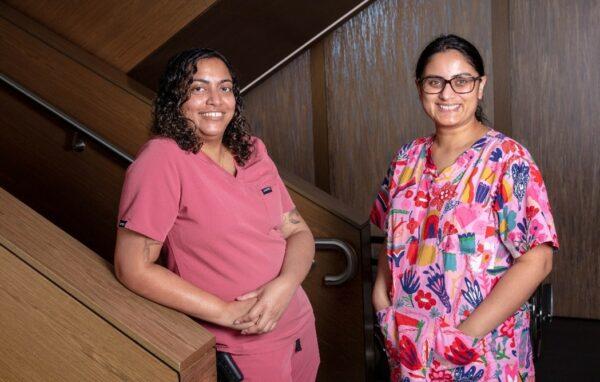
supervision and support
Each term rotation is supervised by a term supervisor, responsible for the orientation and training of the trainee. Supervisors provide continual feedback throughout the rotation and complete mid and end-of-term formative assessments as required. During rotations, trainees work with a range of clinicians, locums, and consultants providing additional support, supervision, and teaching.
The Medical Education Unit is located at both Whyalla and Port Augusta and provides further support throughout the training year. Director of Clinical Training Dr Nadee Assiriyage, Medical Education Officer Ellen Menzies, and Medical Administration Officer Haylee Nichol will facilitate orientation, accommodation, career guidance, counselling, and simulation bookings during the training year.
As an SA Health employee you have access to the Employee Assistance Program as a source of confidential counselling and support if needed.

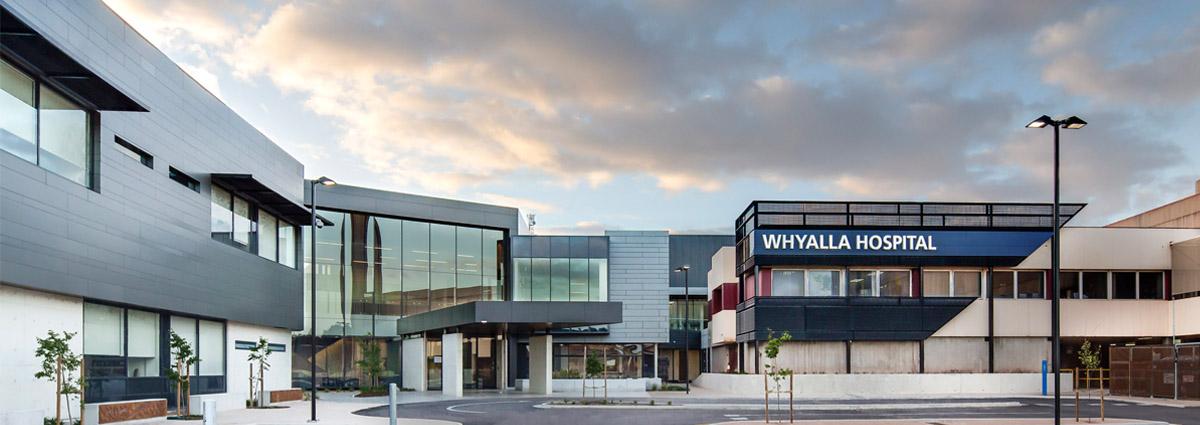 Whyalla Hospital
Whyalla Hospital
Limestone Coast Local Health Network
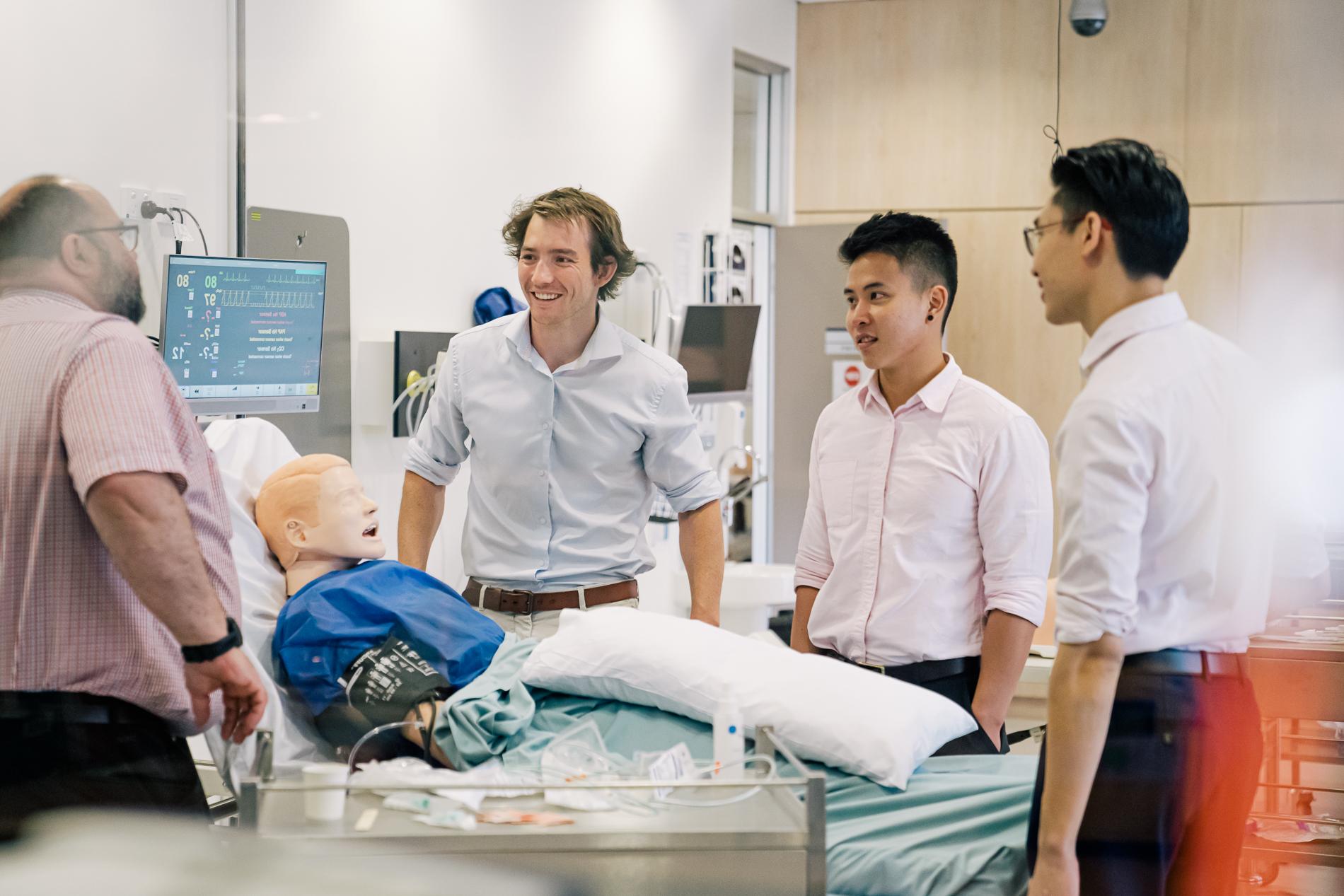
LCLHN Prevocational Doctors
The Limestone Coast Local Health Network (LCLHN) is part of SA Health and covers the areas including the towns and surrounds of Millicent, Naracoorte, Kingston SE, Penola, Mount Gambier, Keith and Bordertown, extending to the Victorian border. LCLHN provide services including accident and emergency, day and inpatient surgery, aboriginal health, obstetric services, community-based health services and aged care services.
-
Health Services and Facilities
Mount Gambier:
Mount Gambier and Districts Health Service (MGDHS) is part of the Limestone Coast Local Health Network. We provide specialist-led acute services including accident and emergency, surgical (including day surgery), obstetric, paediatric, internal medicine, mental health (in and outpatient), anaesthetic services, Aboriginal health and community health services.
MGDHS is the major regional health provider for the lower, mid and upper South East regions with other facilities located nearby in Bordertown, Keith, Kingston, Lucindale, Millicent, Naracoorte and Penola. The catchment area also extends across the border into Western Victoria.
MGDHS services and facilities include:
- Emergency Department including:
- two resuscitation rooms, fast track treatment areas, multiple treatment bays
- negative pressure isolation room and
- separate paediatric area.
- 37 bed Medical Unit including rehabilitation beds
- 27 bed Surgical Unit
- 14 bed Level 4 Maternity Unit with 3 birthing suites
- 2 cot Level 4 neonatal nursery
- 6 bed Paediatric Unit
- 6 bed High Dependency Unit
- 6 bed Mental Health Inpatient Unit
- 11 Day Surgery Chairs
- 4 Operating Theatres
- 6 chair Chemotherapy Unit
- 6 chair Renal Dialysis Unit
- 12 room outpatient Consulting Suite
- 2 out-patient procedures rooms
- Pre-Admission Clinics
Co-located at the Hospital site are the following services:
- Benson Radiology
- SA Pathology
- SA Pharmacy
- Country Health Connect
- South Australian Dental Services
- South East Mental Health Services – inpatient, intermediate care, community-based care
- Drug and Alcohol Services
- Rehabilitation Service
- Renal Dialysis Service
- Aboriginal Health Services
- Emergency Department including:
-
Lifestyle
Mount Gambier is the second most populated city in South Australia. It is located 17 kms from the Victorian border and lies approximately halfway between Adelaide and Melbourne making metropolitan adventures easily accessible.
Striking the ideal balance between the vibrant lifestyle of the big city and comforts of a small town in the heart of the Limestone Coast, including a vibrant café culture, surrounded by signature wine regions boasting social experiences including cellar door, picnics, tours and multiple food and wine festivals throughout the year. Mount Gambier is the perfect base for exploration of the unique landscape and the natural beauty of our region– be it our iconic blue lake, our many caves, sinkholes, parks, and beaches. Mount Gambier offers opportunity for diverse recreational activities including diving, fishing, and water sports. For the elite or casual sporting enthusiast Mount Gambier also offers a strong team sport and athletic culture.
Mount Gambier Hospital is located approximately 3 kms from the city centre with free secure staff parking and café onsite. It is easy to get around Mount Gambier, but private transport is highly recommended in particular to attend GP rotations.
-
Internship
We warmly invite you to become a valued member of the healthcare team and our local community by completing your internship at Limestone Coast Local Health Network (LCLHN).
Here in the Limestone Coast, you will have the opportunity to get a broad practical experience with rotations being offered in Emergency Medicine, General Medicine, General Surgery, Anaesthetics and General Practice, and Orthopaedics. You will gain valuable experiences to improve your confidence and knowledge, you will also be able to challenge yourself in a supportive environment. The working culture at LCLHN embraces teamwork and all team members are highly valued for the skills and knowledge they contribute to patient care.
Being a member of a smaller cohort of interns, you will develop close working relationships with your junior and senior medical colleagues including consultants and have access to individual support from the Medical Education Team.
This internship will set you up well for future specialty training or a rural generalist career with the potential to continue your PGY2+ years in a rural setting.
An insight into work and life in the Limestone Coast
educational opportunities
Mount Gambier:
The Director of Clinical Training (DCT), Medical Education Officer, and Program Administrator make-up the Medical Education Team and are located onsite.
The Medical Education Unit provide a comprehensive educational program addressing the requirements of the AMC National Framework for Prevocational (PGY1 and PGY2) Medical Training. Formal teaching sessions include:
- A five-day orientation to the hospital prior to the commencement of the internship.
- Weekly Intern Tutorial Program:
- Tutorial attendance is protected and paid time for interns.
- The program is developed in collaboration with interns and term supervisors delivered by local and visiting specialists covering core skill requirements.
- Monthly Grand Rounds.
- Additional training workshops presented by local and visiting specialists.
- Clinical simulation scenario-based workshops conducted 3-5 times per year.
- Time to attend sim is paid and protected.
- Funded wellbeing and outside of work activities chosen by the Junior doctor cohort.
In addition, there are regular teaching rounds for interns and opportunities for case presentations, with access to online resources.
supervision and support
Mount Gambier:
There is a nominated supervisor for each rotation who will meet with junior doctors individually to provide feedback and conduct mid and end-of-term assessments. Supervisors are encouraged to give regular feedback to their junior doctors on a day-to-day basis and are trained and supported to provide feedback.
Relocation assistance is up to a maximum of $13,000 for the Limestone Coast with further information available on the SA Health Website.
The Medical Education Unit and Director of Medical Services have an open-door policy where junior doctors are encouraged to drop in to discuss any issues or concerns, they might have. The DCT and MEO also conduct confidential appraisals that are held in the middle of each rotation as an opportunity for the prevocational medical officer to raise any concerns they may have, provide feedback on rotations, seek career guidance etc.
The Medical Education Unit are responsible for orientation, pastoral support, and coordination of the education program for prevocational doctors.
rotations
Mount Gambier:
MGDHS has accredited terms for interns in General Surgery, General Medicine, Emergency Medicine, Anaesthetics, Orthopaedics and General Practice. The General Practice terms are based in either Mt Gambier, Naracoorte with potential for the coastal towns of Kingston and Robe.
When allocating rotations, intern preferences and annual leave requests will be taken into consideration along with the number of available positions and the service requirements of the hospital. Every effort is made to ensure that rotations reflect the intern’s preferences, interest and career direction.
Trainees are rostered in line with the SA Health Salaried Medical Officers Enterprise Agreement (SMOEA) 2022, with Interns being rostered to work weekdays and weekends, with no requirement for night shifts in the intern year.
-
PGY2+
educational opportunities
The Director of Clinical Training (DCT), Medical Education Officer, and Program Administrator make-up the Medical Education Team and are located onsite.
The Medical Education Unit provide a comprehensive educational program addressing the requirements of the AMC National Framework for Prevocational (PGY1 and PGY2) Medical Training. Educational teaching sessions include:
- Weekly Tutorial Program:
- Tutorial attendance is encouraged.
- The program is developed in collaboration with training medical officers, interns and term supervisors delivered by local and visiting specialists covering core skill requirements.
- Monthly Grand Rounds.
- Additional training workshops presented by local and visiting specialists.
- Opportunity to attend clinical simulation scenario-based workshops conducted 3-5 times per year.
- Funded wellbeing and outside of work activities chosen by the Junior doctor cohort.
supervision and support
There is a nominated supervisor for each rotation who will meet with training medical officers individually to provide feedback and conduct mid and end-of-term assessments. Supervisors are encouraged to give regular feedback to their junior doctors on a day-to-day basis and are trained and supported to provide feedback.
Relocation assistance is up to a maximum of $13,000 for the Limestone Coast with further information available on the SA Health Website.
The Medical Education Unit and Director of Medical Services have an open-door policy where junior doctors are encouraged to drop in to discuss any issues or concerns, they might have. The DCT and MEO also conduct confidential appraisals that are held in the middle of each rotation as an opportunity the trainee medical officer to raise any concerns they may have, provide feedback on rotations, seek career guidance etc.
The Medical Education Unit are responsible for orientation, pastoral support, and coordination of the education program for prevocational doctors.
- Weekly Tutorial Program:
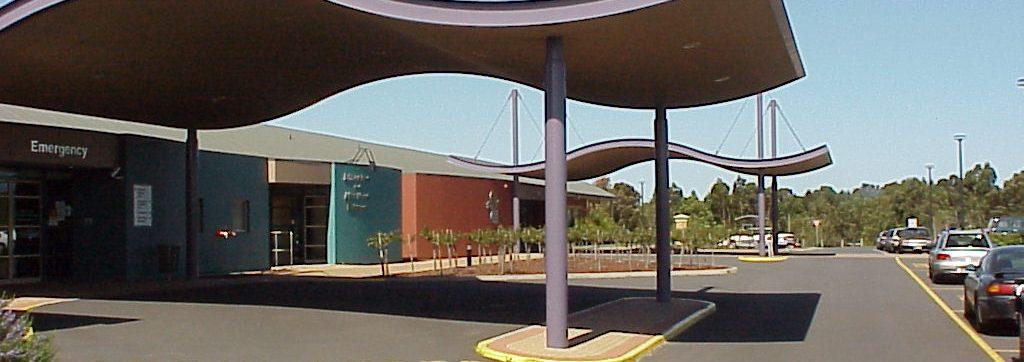 Mount Gambier and Districts Health Service
Mount Gambier and Districts Health Service
Northern Adelaide Local Health Network
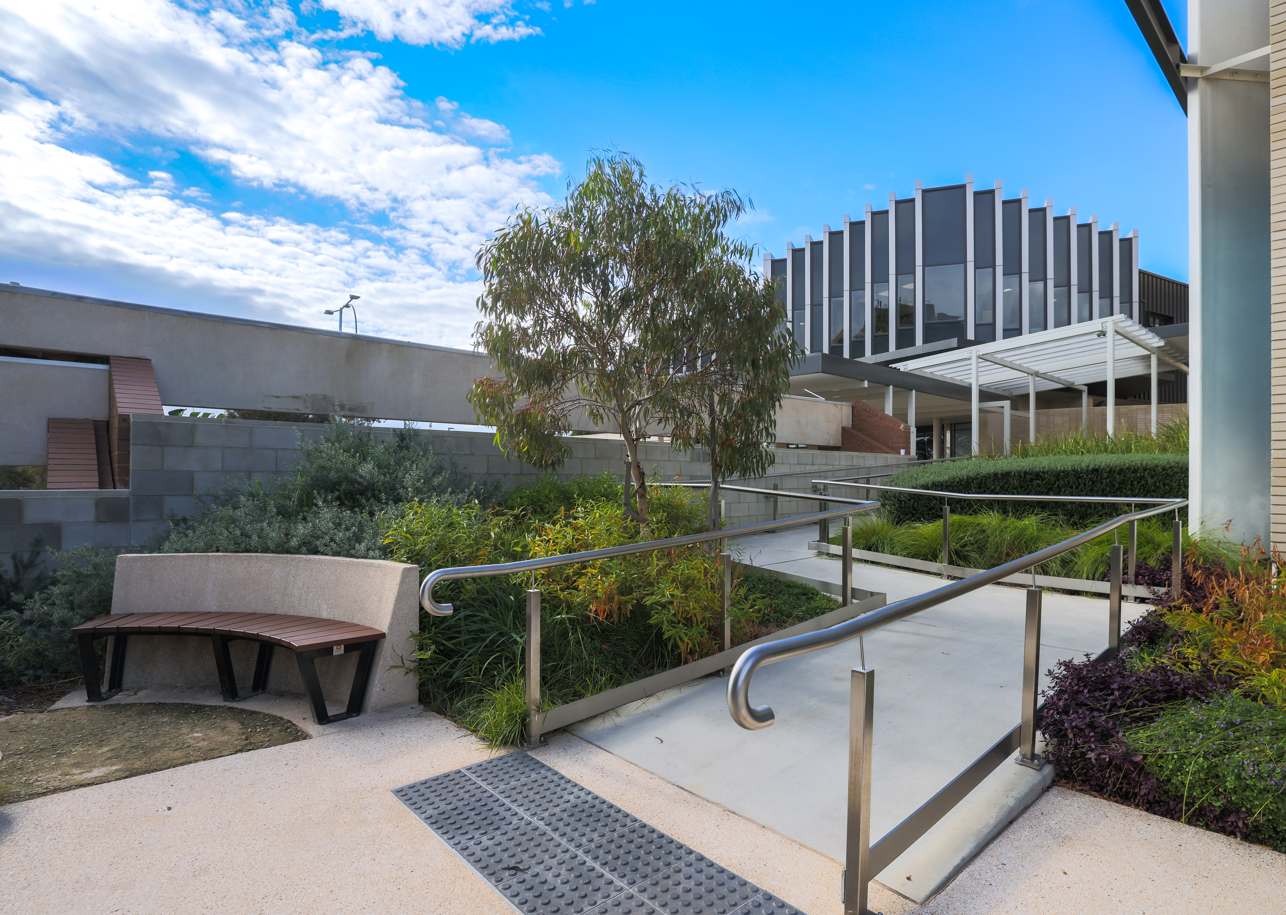
Modbury Hospital
The Northern Adelaide Local Health Network (NALHN) provides acute and community services to northern metropolitan Adelaide and tertiary services to a wider catchment area. NALHN population has increased to over 420,000 being catchment is the fastest growing metropolitan population and currently represents 33% of the metro population. Hospitals and services within the NALHN include the Lyell McEwin Hospital (LMH), Modbury Hospital, a range of sub-acute and primary health care services and a number of state-wide services.
-
Health Services and Facilities
NALHN comprises over 700 inpatient beds, with more than 500 of these at LMH and approximately 200 at MH. Both Lyell McEwin Hospital and Modbury Hospital offer on-site parking, with LMH providing the safety of a high-rise locked compound for secure parking. Modbury Hospital also offers secure parking with gated parking lots for those rostered on afternoon, night & weekend shifts. Both sites have local security officers patrolling the parking areas and monitoring the hospital for the safety and security of all employees, patients, and visitors. Both sites offer cafeteria facilities and a PMO lounge.
Both hospitals operate a broad range of services across acute and sub-acute Medical, Surgical and Psychiatry inpatient and outpatient services.
The Lyell McEwin Hospital is the major hospital for emergency, complex and multi-day Surgery and Medicine. Residents of the North and Northeast of Adelaide have access to a comprehensive 24/7 Emergency Medicine service that includes an Intensive Care Unit, High Dependency Unit, Orthopaedic Trauma Service, and support for other medical emergencies including a Cardiovascular Intervention Suite (CVIS) and interventional radiology services provided by Radiology SA. Both Lyell McEwin and Modbury Emergency Departments have extended care units to support brief inpatient stays in the Emergency Department to help manage demand on the hospital service.
Lyell McEwin Hospital supports all the major medical subspecialties including General Medicine, Respiratory, Renal, Neurology, Gastroenterology, Oncology, Haematology, Endocrinology and Cardiology. Surgical specialties include General Surgery, Upper GI, Colorectal, Breast/Endocrine, ENT, Urology and Orthopaedics who are supported by an Anaesthetics department which also provides an acute pain service. Paediatrics and Women’s Health are also catered for with areas of expertise in Paediatrics, Obstetrics and Gynaecology.
Modbury Hospital is a major same day elective surgery and rehabilitation hub for the North and North Eastern areas of Adelaide in addition to providing medical services including Short Stay General Medicine and Rheumatology; it provides a specialised sub-acute service for Rehabilitation, Geriatrics and Palliative Care. The state-of-the-art rehabilitation centre at Modbury Hospital has eighteen treatment rooms, a gym, hydrotherapy pool, a laboratory for analysing patient mobility, prosthesis services and a kitchen where clients can re-learn and practice everyday tasks.
Psychiatry services run across NALHN providing both inpatient and outpatient support for Emergency Psychiatry, Adult Psychiatry and Older Persons Mental Health.
NALHN is proud to be the first LHN in Australia to provide intern rotations in the Aboriginal Primary Health Division supporting cultural competence within professional practice.
NALHN also provides regional opportunities at Port Pirie Hospital and General Practice rotations at Crystal Brook, Gumeracha, Clare, and Kapunda-Eudunda for those interested in Rural, Regional and Remote Medicine.
-
Internship
Interns based at the Northern Adelaide Local Health Network (NALHN) will find their internship to be both personally and professionally rewarding.
Internship will offer a range of diverse opportunities to consolidate and develop the knowledge, skills and attitudes as interns make the transition from Medical Student to Medical Officer.
Interns appointed to NALHN will be assigned to rotations which may encompass terms at either Lyell McEwin Hospital (LMH), Modbury Hospital (MH) or one of our rural rotations, allowing them to experience a wide range of clinical settings and patient demographics. These rotations provide invaluable exposure to various medical specialties, which will help interns build a strong, well-rounded foundation for their medical careers.
NALHN has a strategic focus to make your intern experience enjoyable, educational, and supportive while challenging you to meet your own personal objectives. This is measured by a high percentage of interns wanting to stay at NALHN to embark on their PMO rotations.
educational opportunities
NALHN hospitals provide a comprehensive educational program based on the on the National Framework for Prevocational (PGY1 and PGY2) medical Training. Both Lyell McEwin and Modbury Hospital sites offer library services, to support your development, with staff librarians who are always willing to assist. The library can also be accessed after hours and used as a quiet area to study.
All interns receive a comprehensive Orientation and Induction Program at the commencement of their internship. Interns are supported throughout the year at each site by the Medical Education Unit (MEU).
- Weekly tutorials are held at both sites and are streamed and recorded via videoconferencing. The Microsoft Teams environment is utilised to support decentralised education when interns are rostered off, or on night shift, allowing for flexibility.
- Weekly ‘Medical Grand Round’ sessions at each site with guest speakers presenting various topics.
- Clinical skills training sessions are scheduled throughout the year and utilise our medium fidelity Simulation Suite to ensure that medical practitioners gain vital practical skills and experience in a safe, controlled environment.
- Lunchtime on Thursday is protected time for interns, enabling you to attend weekly teaching sessions without clinical disruption. Additional education events throughout the hospital to further your learning.
- Specific teaching will occur in each term/division to supplement the work experience. This may include tutorials, bedside teaching, demonstrations, case studies, journal clubs and morbidity and mortality conferences.
- The MEU teaching activities are routinely evaluated by interns. This information is used to enhance the education offered and ensure it remains relevant and high quality.
- Opportunities exist for research participation and recognition, including an Ellen Price Annual award and Prevocational Medical Officer Project Award.
- Opportunities exist for involvement in Quality Improvement activities, teaching, journal club presentations, and representative roles.
supervision and support
Each term of internship has an allocated Term Supervisor as well as senior team members from each team who will directly or indirectly support you during your transition into the intern role. The Prevocational Medical Officer Unit (PMOU) onsite will support your administration requirements as you embark on your intern year.
The Medical Education Unit (MEU) staff at NALHN are available to provide support, guidance and education throughout your internship. They are actively available for your welfare/wellbeing support and a debrief whenever you require support. The MEU also has a range of written resources that are invaluable to support transition to internship.
A peer mentoring program has been running successfully for many years that provides those interns interested in this form of support a mentor for the year in the form of a PGY2+ PMO/Registrar.
The NALHN RMO Society regularly welcome new members (including interns) and hold regular social activities to encourage a positive working culture amongst Junior Medical Officers in NALHN. Ask the MEU about joining.
rotations
Once interns are allocated to NALHN they will be asked for their indicative preference of rotations across the network via the SA MET application system.
Intern rotation preferences and annual leave requests will be taken into consideration along with the number of available positions and the service needs of the hospital. NALHN supports a system that is fair and equitable. All clinical terms are accredited for intern training and every effort is made to ensure that an intern’s allocated rotations reflect their preferences, interest, and career direction. In common with all intern placements in South Australia, some rotations are highly competitive and NALHN is not able to guarantee that an intern will receive all their preferred rotations.
Interns will also participate in the relieving and/or nights (medical or surgical) roster. You will only be allocated one service term in your intern year. Interns will participate in an on-call roster (after-hours, weekends, and public holidays) during some ward-based terms.
As a PGY1 you will be required to complete rotations in terms accredited in four areas of clinical care: acute and critical care, perioperative and procedural care, chronic illness, and undifferentiated care. All rotations offered at NALHN have been accredited for one or two of these areas of clinical care.
NALHN currently offer a range of rotations across all divisions including:
Medicine:
- Short Stay General Medicine Unit
- General Medicine
- Acute Medical Unit
- Respiratory Unit
- Renal Unit
- Neurology/Stroke Unit
- Gastroenterology
- Cardiology
Surgery:
- Upper Gastrointestinal
- Acute Surgical Unit
- Colorectal
- Breast Endocrine Surgery
- Urology/ ENT
- Orthopaedic Surgery
- Gynaecology (Surgery)
Sub-acute:
- Rehabilitation
- Geriatric Rehabilitation
- Palliative Care
- Geriatric Evaluation & Management
- Acute Care for the Elderly (ACE)
Emergency:
- Emergency Medicine – LMH/MH
- Emergency Medicine – PORT PIRIE HOSPITAL
- Emergency Medicine – CLARE HOSPITAL
Psychiatry:
- Psychiatry Acute 1G
- Psychogeriatric Acute 1H
GP/Regional/Rural:
- Crystal Brook General Practice
- Kapunda/Eudunda General Practice
- Gumeracha General Practice
- Clare General Practice
- Port Pirie General Practice
Aboriginal Primary Health:
- Watto Purrunna Aboriginal Primary Health Service
Service Terms:
- Relieving
- Medical Nights
- Surgical Nights
-
PGY2+
educational opportunities
All PMOs receive a comprehensive orientation and induction program at the commencement of employment with NALHN. PMOs are supported throughout the year at each site by a medical education team from the MSD, comprised of the Director of Clinical Training (DCT) Medical Education Officers (MEO) and Medical Education Registrars (MER).
Education opportunities include, but are not limited to:
- Weekly tutorials covering a broad range of medical and surgical topics of interest held at the Lyell McEwin Hospital and video conferenced across sites. These teaching activities are evaluated. This information is used to improve the sessions presented and for quality assurance.
- Weekly Medical Grand Round at both sites with guest speakers presenting various topics Clinical skills training sessions are scheduled throughout the year.
- Teaching that is more relevant to specific PMO positions will occur in each term/division to supplement the work experience. This may include tutorials, demonstrations, journal clubs, and morbidity and mortality conferences.
- MET Training simulation sessions as part of combined sessions with ICU Registrars and PMOs. PMOs can participate in simulation sessions, often in collaboration with ICU Registrars and other medical staff. These sessions focus on improving practical skills in emergency scenarios, enhancing the ability to respond to critical situations in a controlled, simulated environment.
- NALHN provides several platforms for PMOs to engage in research and gain recognition for their academic efforts, including the Ellen Price Award at Modbury Hospital for a trainee presenting original research, and Research Day at Lyell McEwin Hospital, where trainees with original research have an opportunity to present to the NALHN community are held yearly.
supervision and support
Supervision will be provided by Registrars and Consultant staff from the respective Divisions and Units. The MSD provides support to the Units and Divisions and are involved in formal assessment procedures.
Each PMO role will have an allocated Term Supervisor as well as other senior team members who will directly or indirectly support you.
The Medical Education Unit (MEU) staff at each site are available to provide support, guidance, and education throughout your PMO terms. They are available for your welfare/wellbeing support and debriefing whenever required.
The Prevocational Medical Officer Unit (PMOU) on site will support your administration requirements.
Both the PMOU and the MEU are useful sources of information.
NALHN prides itself on promoting staff wellness. By investing in the junior medical officers that choose to work in the North and by constantly striving to ensure quality in the rotations, education and support they receive, NALHN hopes these prevocational doctors will become their consultants of the future.
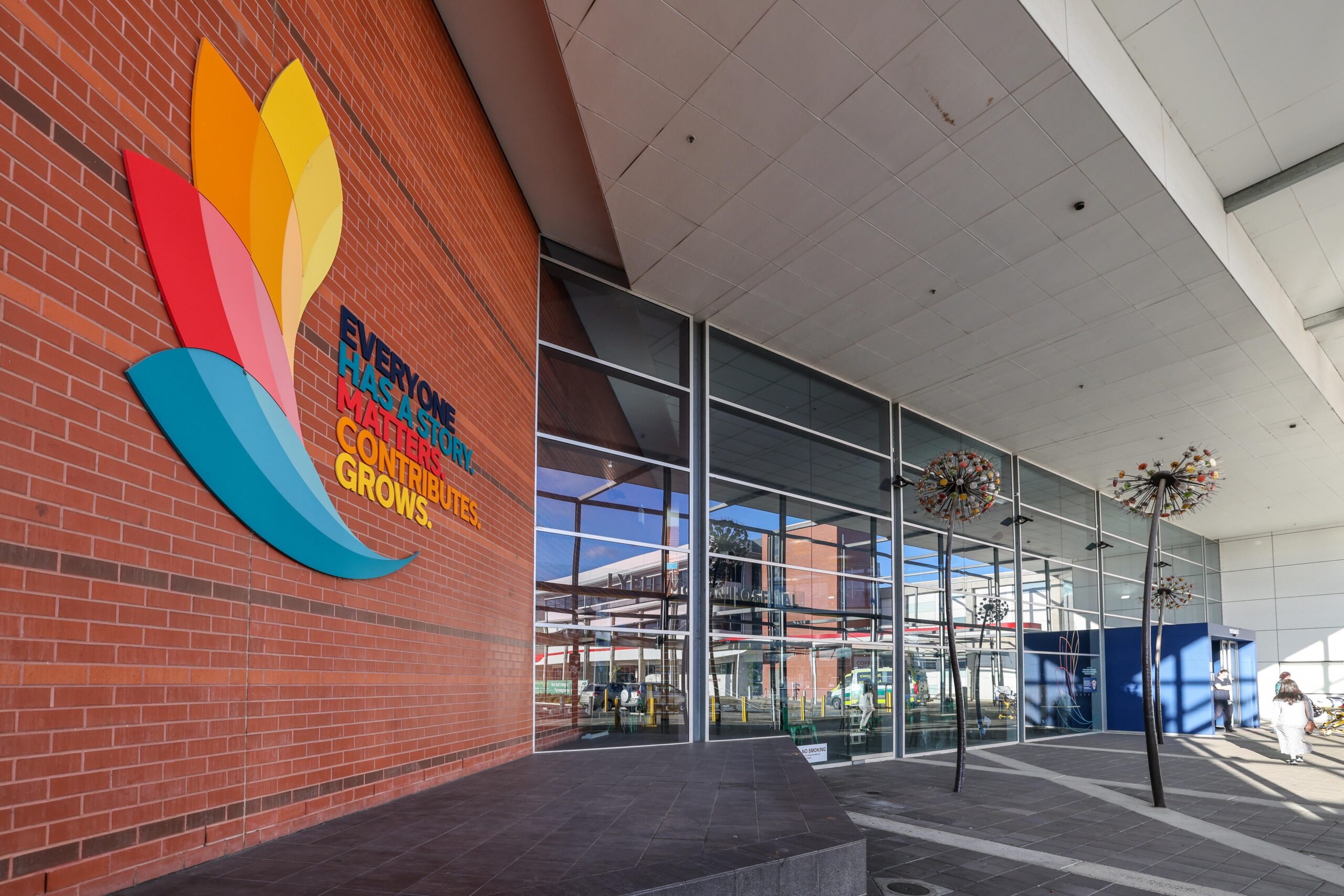 Lyell McEwin Hospital
Lyell McEwin Hospital
Riverland Mallee Coorong Local Health Network
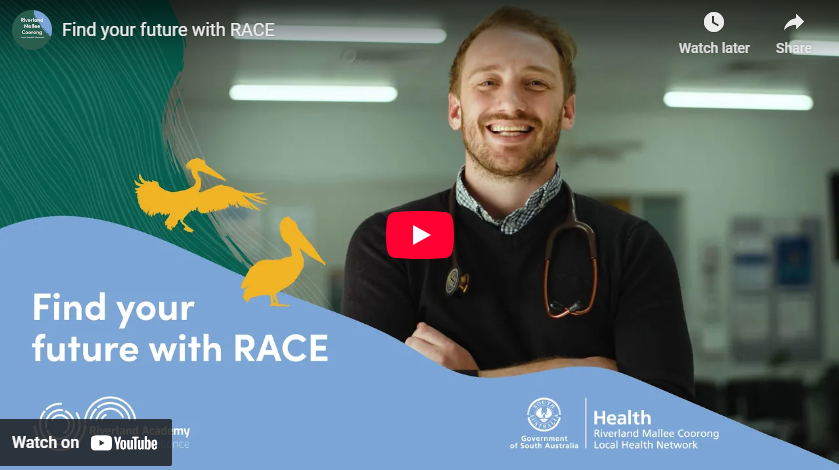 View the RMCLHN video on ‘Find your future with RACE’
View the RMCLHN video on ‘Find your future with RACE’
The Riverland Mallee Coorong Local Health Network (RMCLHN) supports approximately 70,000 people living in the Riverland, and the Murray River, Lakes and Coorong areas of South Australia, extending east to the Victorian Border.
This includes the towns and surrounds of Renmark, Paringa, Berri, Barmera, Waikerie, Loxton, Pinnaroo, Lameroo, Karoonda, Mannum, Murray Bridge, Tailem Bend, Meningie, Tintinara and Coonalpyn.
Our wide range of health care services include, accident and emergency, day and inpatient surgery, Aboriginal health, mental health, obstetric services, chemotherapy, renal dialysis services, community and allied health services and aged care services.
-
Health Services and Facilities
Intern experiences will be based at the Riverland General Hospital in Berri and the surrounding general practice clinics, RMCLHN aged care facilities and RMCLHN hospitals.
About Riverland General Hospital (RGH)
RGH provides a comprehensive range of medical and surgical services to patients from across the Riverland and surrounding communities including the Mallee.Patients may commence their stay at Riverland General Hospital but finish their care at one of the neighbouring Riverland hospitals with specialist medical or allied health input when required. All hospitals in the Riverland work collaboratively to support the patient care needs of the region.
The hospital is collocated with the following services:
Visit the RGH webpage to find out more about services and facilities.
- SA Medical Imaging (SAMI)
- SA Pathology
- SA Pharmacy
- South Australian Dental Services
- Country Health Connect
- Flinders University Rural and Remote Health SA
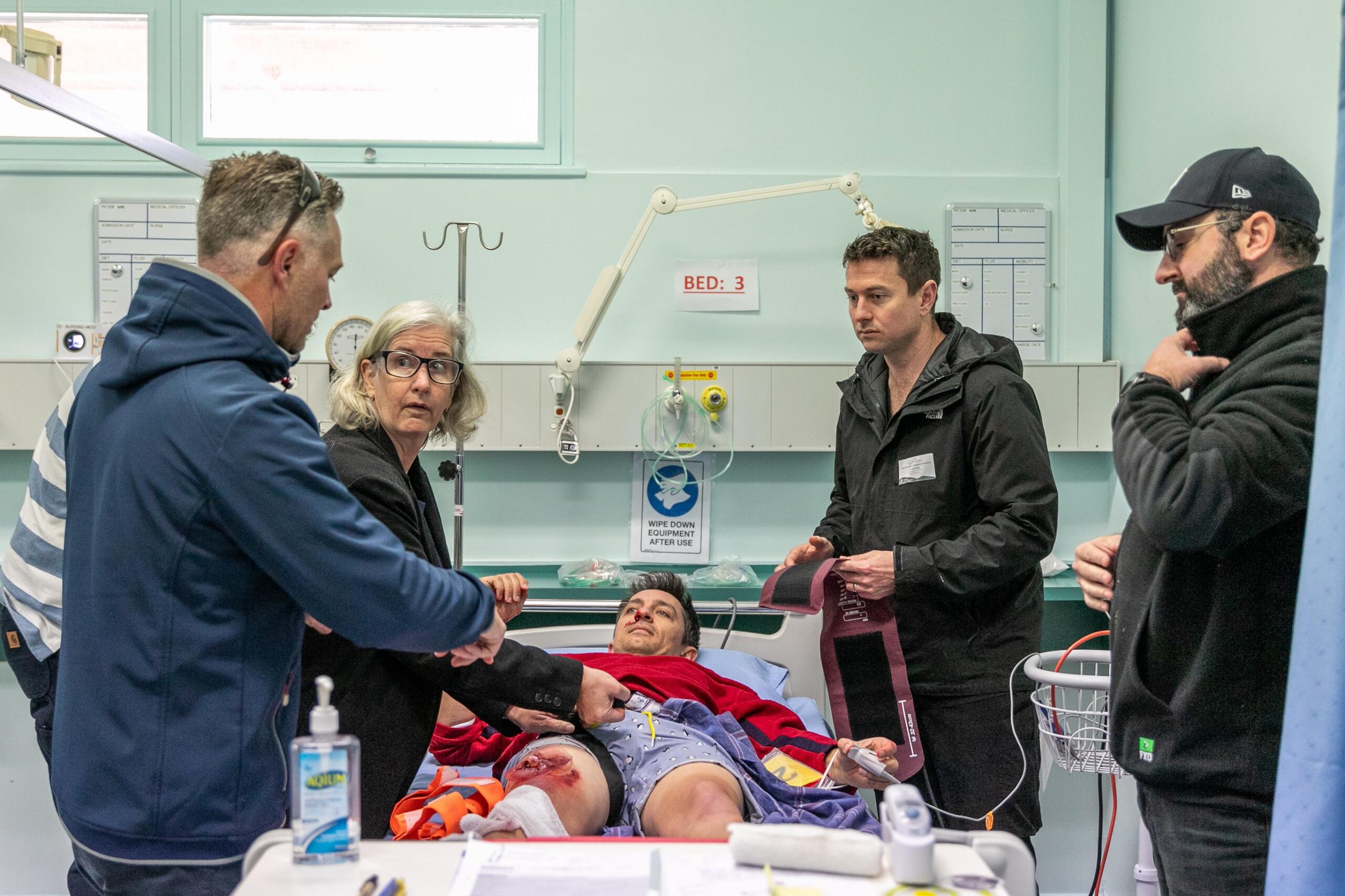
The annual RACE Emergency Response Conference 2024. Photos courtesy of Riverland Commercial Photography and Riverland Mallee Coorong Local Health Network
-
Lifestyle
Warm dry summers and relatively mild winters make it possible to take full advantage of life, all year round, in one of the most beautiful, naturally diverse regions in Australia.
The Riverland provides abundant opportunities for you to explore and craft your own way of life. The landscapes, river and meandering backwaters. The people, the produce, and the sense of regional pride and community spirit make this a place you’ll want to call home. Lake Bonney is a large freshwater lake in the centrally located Barmera township, another Riverland haven for water sports, fishing, kayaking and world-famous sunsets.
Residential property prices are substantially lower than the South Australian median and offer a mix of building and construction styles. Choose from wonderful old stone villas with large rooms, tall chimneys and high ceilings, or ultra-modern, open-plan, energy efficient spaces. You can also take advantage of the region’s buoyant housing construction industry and build your dream home.
Each major town has a vibrant retail area, from the charm of traditional main street precincts filled with small local businesses, through to modern plaza style shopping centres with multi-national retailers and major supermarkets.
Local farmer’s markets, together with the many roadside produce stalls scattered throughout the region, offer an impressive array of locally-grown fresh fruit and vegetables. Hotels, clubs, restaurants, cafes and take-away outlets are shaping an emerging vibrant food and wine scene.
We have a strong sporting culture, with multiple turf ovals, golf courses, tennis courts, bowling greens, netball courts, stadiums, recreation centres and swimming pools across the region. Other recreational opportunities abound, including bushwalking, fishing, boating and water-skiing.
The region has a community spirit to be proud of. The quality of life is greatly enhanced with the countless volunteer opportunities that make many of our regional events, activities and services possible. There’s a host of avenues for social interaction and community involvement, and new faces are always welcome.
Visit the Rural Generalist Program South Australia webpage to find out more.
-
Internship
You are invited to complete your internship through the Riverland Academy of Clinical Excellence (RACE) at RMCLHN.
Riverland Academy of Clinical Excellence
RACE is a multidisciplinary division within RMCLHN that was created to deliver on our commitment to take responsibility for training our own clinical workforce, creating and improving relevant evidence bases for our clinical practice, and bringing the benefits of integrated teaching, research and clinical care to the communities in our region.
Based on holistic understanding of health and integrating hospital and general practice training at all levels with a broad range of contemporary training in advanced skills, it is a one-stop-shop for career advancement in general practice and rural generalism. The Prevocational Medical Officer (PMO) program is also excellent preparation for other specialty training programs and includes opportunities to advance your career through becoming part of local and international research and education networks.
RACE Training Pathway
RMCLHN was the first regional Local Health Network to pilot the Single Employer Model (SEM). We listened to medical students and prevocational doctors around the country who wanted a secure single-employer contract for the duration of their training, who wanted to be able to choose to live in one place if they wish, and who want flexibility for part-time employment. All of this in supportive communities where you have meaningful work while you learn.
Our Academy Intern Program is based in the Riverland towns that have been the home of the Parallel Rural Community Curriculum for more than 25 years. New GPs and other specialists have brought an exciting culture of ‘can-do together’ to the region. Accommodation support is provided in Berri, or you can choose to establish yourself in the town of your choosing, knowing that our teaching towns are all within easy reach, and a five-year contract provides you the opportunity to plan your unique life and learning future.
To learn more about training with RACE visit www.sahealth.sa.gov.au/JoinRACE.
educational opportunities
Riverland General Hospital
The RMCLHN Director of Clinical Training, Medical Education Officer, and Medical Education Support Officer make up the Medical Education Team who are located onsite at RGH.
The RMCLHN Medical Education Unit provides a comprehensive education program addressing the requirements of the Australian Curriculum Framework for Junior Doctors (ACFJD).
Formal teaching sessions include:
- a one-week orientation to the hospital prior to commencing the internship.
- an Intern Tutorial Program.
- regular Journal Clubs in a small group learning environment for Psychiatry and public health.
- Ground Rounds each month with national and international guest speakers, training workshops presented by local and visiting specialists, and RGH Clinical Directors.
- clinical simulation, scenario-based workshops conducted a minimum four times per year, in which Interns will have paid, protected time to attend with access to mid fidelity manikins.
- regular teaching rounds.
supervision and support
There is a nominated supervisor for each rotation who will meet with prevocational doctors individually to provide feedback and conduct mid and end-of-term formative assessments. Supervisors are also encouraged to provide day-to-day/regular feedback.
The Medical Education Unit has an open-door policy where prevocational doctors are encouraged to drop-in to discuss any issues. The RMCLHN Director of Clinical Training and the Medical Education Officer also arrange confidential appraisals that are held in the middle of each rotation as a formal opportunity to ask for advice or support, or to highlight concerns. They are also available to discuss career pathways and receive your feedback about the training program.
rotations
RGH has accredited core terms for interns in General Medicine, General Surgery, Emergency Medicine and non-core rotations may include Aged Care in General Practice and Relieving. The General Practice terms are based in the nearby Berri Medical Clinic, Barmera Medical Clinic and Renmark Medical Clinic.
When allocating rotations, intern rotation preferences and annual leave requests will be taken into consideration, along with the number of available positions and the service requirements of the hospital. Every effort is made to ensure that rotations reflect the intern’s preferences, interest and career direction. The Medical Education Unit is responsible for rostering and ensuring trainees are rostered in line with the SA Health Salaried Medical Officers Enterprise Agreement (SMOEA) 2022.
The Medical Education Unit is responsible for orientation, pastoral support and coordination of the education program for prevocational doctors at RGH.
Other Information
Interns are rostered to work 8.5-hour shifts which includes time for a meal break. The rosters are designed to enable all Interns to have a great work-life balance and enjoy what the Riverland region has to offer. Leave requests are made to the Medical Education Team and interns are encouraged to plan their leave as early as possible in the year. Average hours per fortnight are 76-80 hours with some ability to undertake optional overtime with cover shifts at RGH.
-
PGY2+
PGY2+ opportunities are available across the Riverland Mallee Coorong Region including Murray Bridge and Mannum. For more information on PGY2+ please click here.
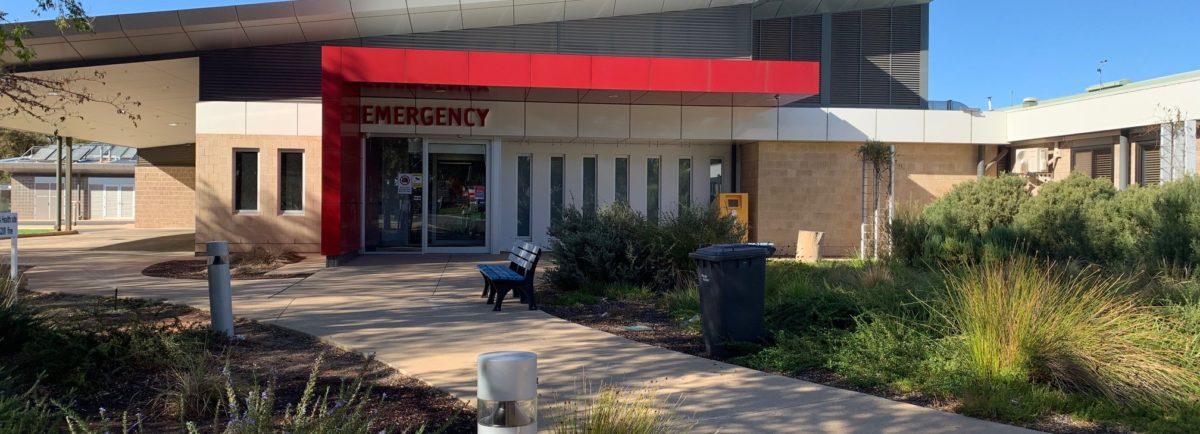 Riverland General Hospital
Riverland General Hospital
Southern Adelaide Local Health Network
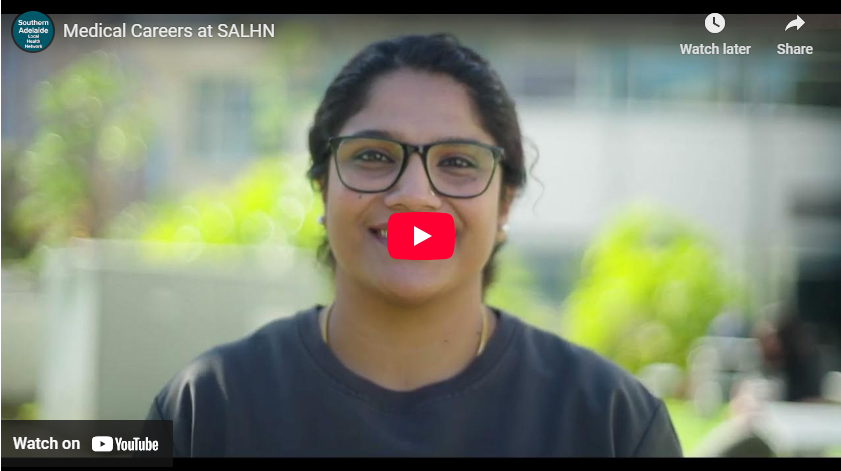 View the SALHN video on ‘Medical Careers at SALHN’
View the SALHN video on ‘Medical Careers at SALHN’
The Southern Adelaide Local Health Network (SALHN) comprises Flinders Medical Centre (FMC), Noarlunga Hospital (NH) and Repat Health Precinct (RHP). SALHN has strong partnerships with Flinders University. SALHN provides care for around 350,000 people living in the southern metropolitan area of Adelaide as well as providing a number of state-wide services, and services to those in regional areas. Medical Trainees employed by SALHN are offered rotations at all three sites, as well as some of our partner sites, and as such have an enviable selection of rotations and locations.
-
Health Services and Facilities
Flinders Medical Centre (FMC) is an acute tertiary hospital 12km or approximately 30 minutes south of the Adelaide Central Business District with 680 beds. Noarlunga Hospital (NH) is located 17km (25 minutes) south of FMC and has 80 beds. The Repat Health Precinct (RHP) offers a comprehensive range of aged care and rehabilitation services, including specialised care for individuals with acute dementia and severe behavioural and psychological symptoms. Located 5km (15 minutes) northeast of FMC, RHP has 76 beds available. Alternatively, PMOs may also rotate to Jamie Larcombe Centre (JLC) at Glenside Hospital for a psychiatry rotation. The JLC, a purpose-built facility with 24 beds, is located 14km (25 minutes) northeast of FMC. Southern Mental Health provides a range of integrated services across community and hospital settings addressing mental health concerns in collaboration with non-Government organisations.
SALHN is currently undergoing some major redevelopments at Flinders Medical Centre, Noarlunga Hospital and Repat Health Precinct over the next several years across all sites. These upgrades will provide southern suburbs’ residents with better access to vital health care, in turn improving patient flow and reducing pressure on the system.
-
Lifestyle
Located in Adelaide, South Australia, SALHN offers a unique advantage of being in close proximity to both pristine beaches and the vibrant city centre (20 mins by train). Enjoy the best of both worlds by indulging in the beachside lifestyle or exploring the bustling city life.
A high proportion of SALHN doctors live in the Glenelg/Brighton area, which is a short 10-minute drive to the Flinders Medical Centre:

World-Famous McLaren Vale Wine Region: As a Prevocational Medical Officer at SALHN, you will have the incredible opportunity to explore the picturesque McLaren Vale wine region. Delight in the world-class wineries, scenic landscapes, and exceptional culinary experiences!
Adelaide Festivals / Events:
Tour Down Under (January)
Adelaide Fringe Festival (March)
WOMADelaide (March)
Adelaide Cabaret Festival (June)
Illuminate (July)
OZasia Festival (October/November)
Adelaide 500 Supercar Racing (November) -
Internship
educational opportunities
All interns receive a comprehensive orientation and induction program at the commencement of their internship, and receive ongoing support in their educational journey from a dedicated medical education team comprised of the Executive Director of Medical Services (EDMS), Director of Clinical Training (DCT), Deputy Directors of Clinical Training (DDCT), Medical Education Registrars and Medical Education Officers (MEOs).
Trainees are provided with a well-rounded educational program that aligns to the National Framework for Prevocational Medical Training and welfare needs.
The weekly intern tutorials offer a broad, clinically focused curriculum tailored to the learning requirements of prevocational doctors as they progress through their year.
The clinical simulation program runs weekly with interns participating in four interactive workshops giving interns the opportunity to manage clinical scenarios in a safe and supportive environment. Specialised simulation nurses and the Medical Education Team guide small groups of trainees through multiple cases and facilitate post-simulation debriefs to reinforce learning. Sessions are facilitated by our Deputy DCT’s and Medical Education Registrars.
Both tutorials and simulation sessions are protected teaching time for interns.
Interns are also invited to attend the weekly PGY2+ education program (Medi-JETS) which provides an allocated discipline tutorial and skill program.
Grand rounds are held weekly throughout the year, providing junior doctors with the opportunity to expand their clinical and theoretical knowledge.
Additionally, each division offers a dedicated education program that interns are encouraged to attend. There is also an opportunity to undertake ALS training throughout the year.
Interns are also invited to apply for various leadership opportunities, providing an excellent platform for them to contribute to the future of healthcare while developing essential leadership skills.
supervision and support
Interns within SALHN are well supported throughout their internship. Medical Education Unit staff are available to assist trainees at any point, offering both personal and clinical leadership to guide them throughout the year. A Medical Education Registrar is allocated to each intern at the beginning of the year who will provide mentorship and guidance as needed.
Throughout internship, trainees are supervised both in and out of hours by senior members of each rotation. The team provides clinical, educational and pastoral support to junior members of the team, ensuring they are well-supported in all aspects of their role. Interns are encouraged to discuss any concerns within their team as well as seeking assistance from the Medical Education Unit. All prevocational doctors are made aware of the Employee Assistance Program as an additional source of support for confidential counselling and support and they are also encouraged to have their own GP.
To further promote staff well-being, the SALHN Staff Wellbeing team hosts monthly Schwartz Rounds—safe, reflective forums where staff from all disciplines can share and discuss the emotional and social challenges of working in healthcare.
rotations
SALHN takes into consideration preferences for rotations including leave preferences, while ensuring compliance with the Australian Health Practitioner Regulation Agency (AHPRA) and South Australian Medical Education and Training (SA MET) requirements. This approach ensures all trainees receive a well-rounded education program and fulfils the requirements for General Registration.
For rotations that are highly sought after, such as paediatrics, applicants are contacted by the Medical Education Officer after submitting their preferences to SA MET. They are then invited to submit an expression of interest to support of their rotation request. Applicants for this rotation will be selected by the Paediatric Term Supervisor.
Rotations within SALHN are spread across all sites including Flinders Medical Centre (FMC), Noarlunga Hospital (NH), Repat Health Precinct (RHP) and the Jamie Larcombe Centre (JLC). SALHN continues to offer the rural GP/ED rotations which offer great exposure to general practice in a rural setting in partnership with the Rural Doctors Workforce Agency (RDWA) including sites in Angaston, Mannum and Murray Bridge. Trainees may be expected to complete a service term of nights or relieving.
Rotations available at SALHN include:
Cardiology Flinders Medical Centre Cardio-Thoracic Surgery Flinders Medical Centre Colorectal Surgery Flinders Medical Centre Ear, Nose and Throat (ENT) Flinders Medical Centre Emergency Flinders Medical Centre and Noarlunga Hospital Gastroenterology Flinders Medical Centre General and Gastro Intestinal Surgery Flinders Medical Centre General Medicine Short Stay (GMSS)/Acute Medical Unit Flinders Medical Centre General Internal Medicine Flinders Medical Centre and Noarlunga Hospital Geriatric Evaluation and Management (GEM) Noarlunga Hospital and Repat Health Precinct Gynaecology Flinders Medical Centre Haematology Flinders Medical Centre Hepato-Pancreato-Biliary Surgery Flinders Medical Centre Infectious Diseases and Dermatology Flinders Medical Centre Medical Nights Flinders Medical Centre Neurosurgery Flinders Medical Centre Oesphago-Gastric Surgery Flinders Medical Centre Older Persons Assessment and ED Liaison (OPAL) Flinders Medical Centre Orthopaedics Flinders Medical Centre Paediatrics Flinders Medical Centre Plastic Surgery Flinders Medical Centre Psychiatry Flinders Medical Centre, Noarlunga Hospital and Jamie Larcombe Centre Relieving SALHN wide Renal Flinders Medical Centre Respiratory Flinders Medical Centre Rural General Practice/Emergency Angaston, Mannum and Murray Bridge Stroke Flinders Medical Centre Surgical Nights Flinders Medical Centre Urology Flinders Medical Centre Vascular Surgery Flinders Medical Centre other information
All medical officers are paid for the hours worked. Interns are allocated three weeks of annual leave with two weeks taken in their ED rotation and the remaining week can be taken during another term as negotiated with the Medical Education Unit. Interns are asked to preference leave, and allocations are made based on this information. All leave is tracked to ensure that interns meet the requirements of the National Framework for Prevocational Medical Training which includes 47 weeks of training and exposure to each of the clinical care categories. Consideration is given to requests for special leave.
FMC, NH, RHP and JLC are accessible via car, bus and taxi services. NH is accessible via train, and FMC is now connected to the Flinders Railway line (an extension of the Tonsley line) which has stations at Flinders and Tonsley. All sites have adequate car parking for staff and have security to assist staff to their car at night if required. Interns must have a car and a valid licence for rural rotations. SALHN is easily accessible via the southern freeway and the renowned southern vales wineries, Victor Harbor and Kangaroo Island are close by for day trips or longer stays.
To further promote staff well-being, the SALHN Staff Wellbeing team hosts monthly Schwartz Rounds—safe, reflective forums where staff from all disciplines can share and discuss the emotional and social challenges of working in healthcare.
-
PGY2+
There are 5 main programs for prevocational PGY2+ Doctors at SALHN, including:
General Training and GP/ACRRM Training
A program for prevocational junior doctors seeking a broad range of rotations to assist them with their career planning or progress towards a vocational career in General Practice / Rural & Remote Medicine.
Prevocational Acute and Critical Care Program
a boutique program with approximately 8 trainees, with a focus on developing a career within the fields of acute and critical care.
The Adelaide Prevocational Psychiatry Program (tappp)
A state-wide based program for those interested in a Mental Health career, or those seeking further mental health exposure.
Medical Service Resident Training Program
A SALHN-based program within the Division of Medicine, Cardiac, and Critical Care, which has a focus on those with an interest in a career in Medicine.
Surgical Resident Medical Officer Training PrograM
A SALHN-based program within the Division of Surgery and Perioperative Medicine, which has a focus on those with an interest in a career in Surgery.
educational opportunities
The PGY2+ trainee cohort within General Training and the Prevocational Acute and Critical Care Program at SALHN is supported in their educational program by a dedicated medical education team comprised of the Executive Director of Medical Services (EDMS), Director of Clinical Training (DCT), Deputy Directors of Clinical Training (DDCTs), Medical Education Registrars, and Medical Education Officers (MEOs). The Prevocational Medical Officer Unit (PMOU) also plays a vital role in supporting these trainees.
The PGY2+ training cohort within The Adelaide Prevocational Psychiatry Program, the Medical Service Resident Training Program, and the Surgical Resident Medical Officer Training Program is supported by their respective divisions within SALHN, but the Medical Education Team provides support when needed.
A weekly PGY2+ education program, Medi-JETS, provides structured tutorials and procedural skills training. These sessions cover a broad range of topics, designed to ensure a well-rounded generalist approach during the prevocational years.
RMO simulation sessions are held on Tuesday afternoons, giving General Trainees the opportunity to manage complex clinical scenarios in a safe and supportive environment. Specialised simulation nurses and the Medical Education Team guide small groups of trainees through multiple cases and facilitate post-simulation debriefs to reinforce learning.
PGY2+ GP trainees registered with ACRRM or RACGP in their final 12 months of hospital rotations are invited to participate with the GP Integration Unit (GPIU) in additional small-group general practice tutorials. These cover core topics to help ease the transition to community general practice placements.
Grand rounds are held weekly throughout the year, providing prevocational medical officers with opportunities to enhance both their clinical and theoretical knowledge.
Each department offers a dedicated education program, which all residents are expected to attend as part of their rotation timetabling. These typically include ward-based and didactic teaching, journal club, radiology meetings and mortality and morbidity meetings.
Additionally, trainees have the opportunity to undertake ALS training throughout the year.
supervision and support
SALHN prides itself on fostering a supportive culture for all prevocational trainees. The Medical Education Unit staff are always available to assist trainees, offering both personal and clinical mentorship.
Whilst there is an increase with professional responsibility expected from resident medical officers, they are still heavily supported by registrars, fellows and consultants. Residents always receive supervision from senior members of their rotations.
Additionally, all prevocational doctors are informed about the Employee Assistance Program, which provides confidential counselling and support. They are also encouraged to have their own GP for ongoing care.
To further promote staff well-being, the SALHN Staff Wellbeing team hosts monthly Schwartz Rounds—safe, reflective forums where staff from all disciplines can share and discuss the emotional and social challenges of working in healthcare.
rotations
Acute and Critical Care Medicine
Medical specialties
Surgical specialties
Rehabilitation and Aged Care
Rural Health Networks
Women’s and Children’s Health
Mental Health Services
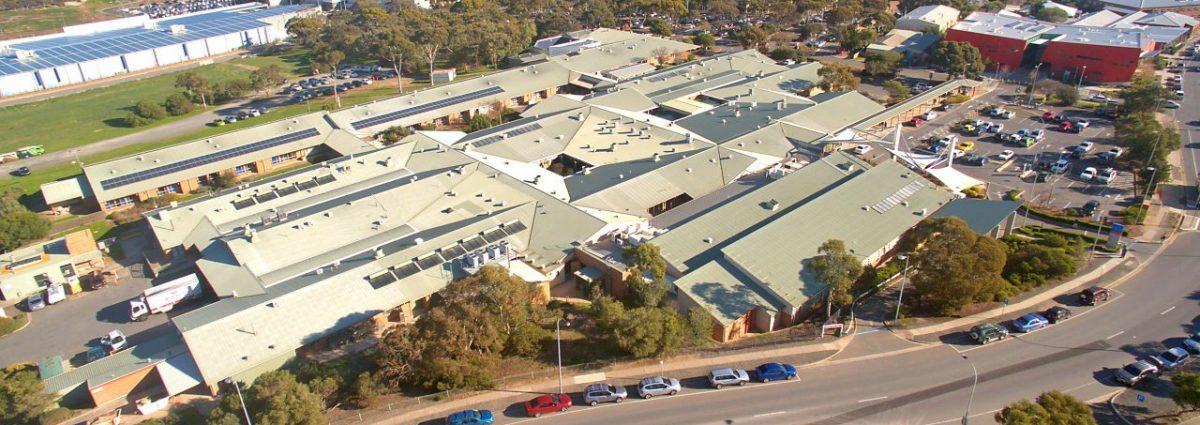 Noarlunga Hospital
Noarlunga Hospital
Women’s and Children’s Health Network
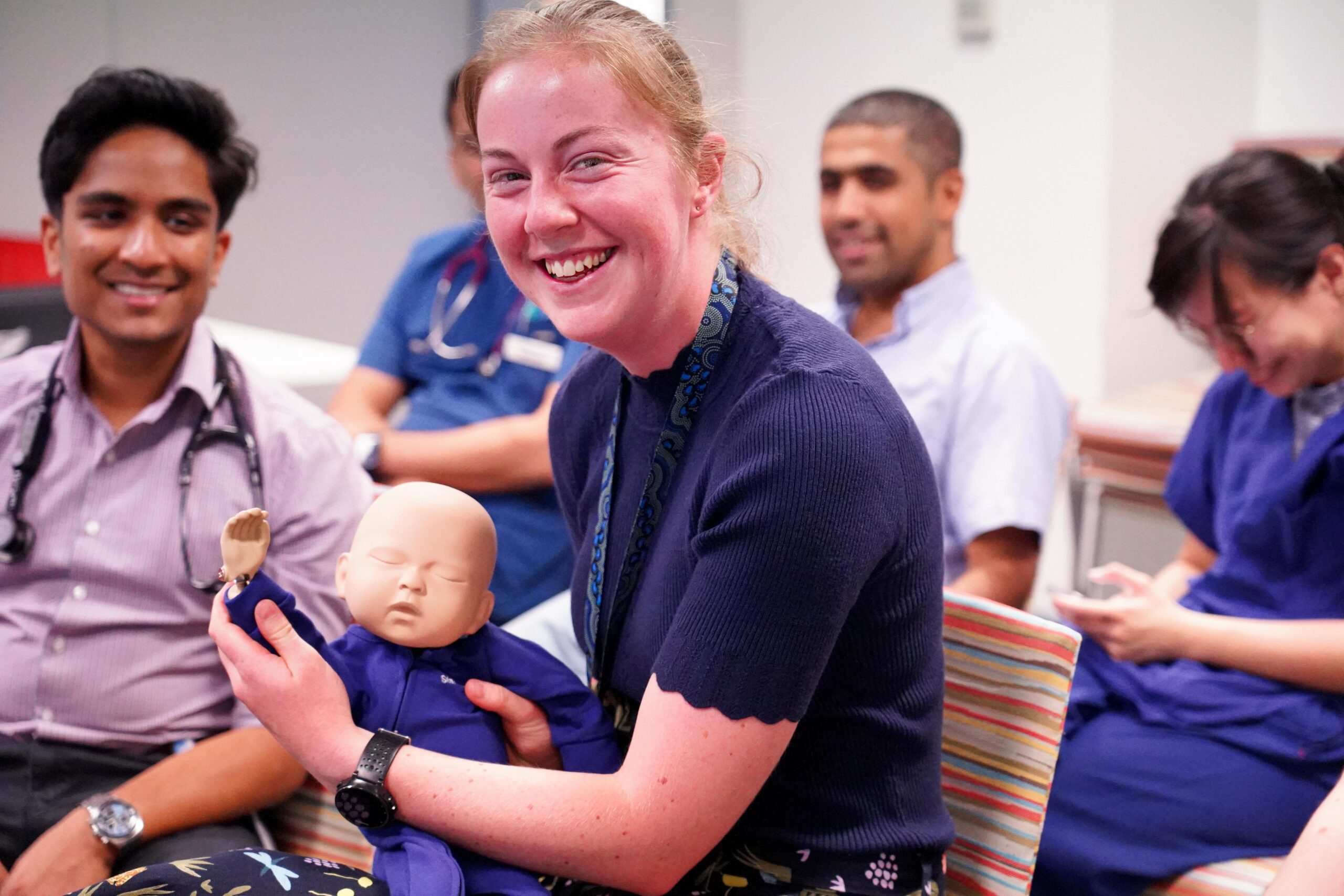
WCHN Prevocational Doctors
The Women’s and Children’s Health Network (WCHN) is South Australia’s leading provider of specialty care and health services for women, babies, children and young people and their families in South Australia.
WCHN comprises the Women’s and Children’s Hospital (WCH), statewide Child and Adolescent Mental Health Service (CAMHS), statewide Community and Family Health Services (CaFHS), Health and Recovery, Aboriginal Health Division, Trauma Safety Services and a range of metropolitan, rural and remote community-based services for babies, children, young people and women across South Australia and interstate. These services are provided across 180 sites throughout South Australia and employ more than 4,000 staff.
The WCH is a major teaching hospital affiliated with the University of Adelaide, the University of South Australia, and Flinders University. Through education, research and its continual quest for excellence in health care, the WCH recognises and is dedicated to the health and wellbeing of women and babies, children and young people in South Australia and beyond.
-
PGY2+
Educational Opportunities
Prevocational training at WCHN prepares PGY2+ doctors for GP Training and entry into RACP, RACS and RANZCOG College programs.
We encourage applications from International Medical Graduates eligible for the Competent Authority pathway. WCHN is unable to provide the necessary rotations for IMGs applying through the Standard pathway.
Education programs run in general paediatric medicine, medical services and paediatric emergency medicine, surgery and obstetrics and gynaecology. PMOs may also attend other educational sessions across the network.
PMOs will have the opportunity to participate in Simulation based education throughout various terms and as part of induction and orientation programs. These may include the Paediatric Onboarding Resuscitation Course, Neonatal Life Support and Paediatric Intermediate Life Support.
Zero Tolerance to Racism – Understanding and Responding to Racism is an in-person education session coordinated and facilitated by WCHNs Principal Aboriginal Cultural Learning Consultant. This education session is available to all WCHN staff.
Supervision and Support
PMOs are allocated a Supervisor upon commencement in each rotation. Trainees and Supervisors meet for regular formal and informal catch-ups throughout the term, including a beginning of term meeting, and formal mid-term and end of term assessments.
AT WCH PMOs are supported the MEU, PMO Unit, and the Chief Resident Medical Officer (CRMO).
The Employee Assistance Program provides all employees, volunteers and their immediate families access to free, confidential and professional counselling.
Fitness Passport is a workplace health and fitness membership program which gives WCH staff members and their families access to a wide choice of gyms and pools across South Australia.
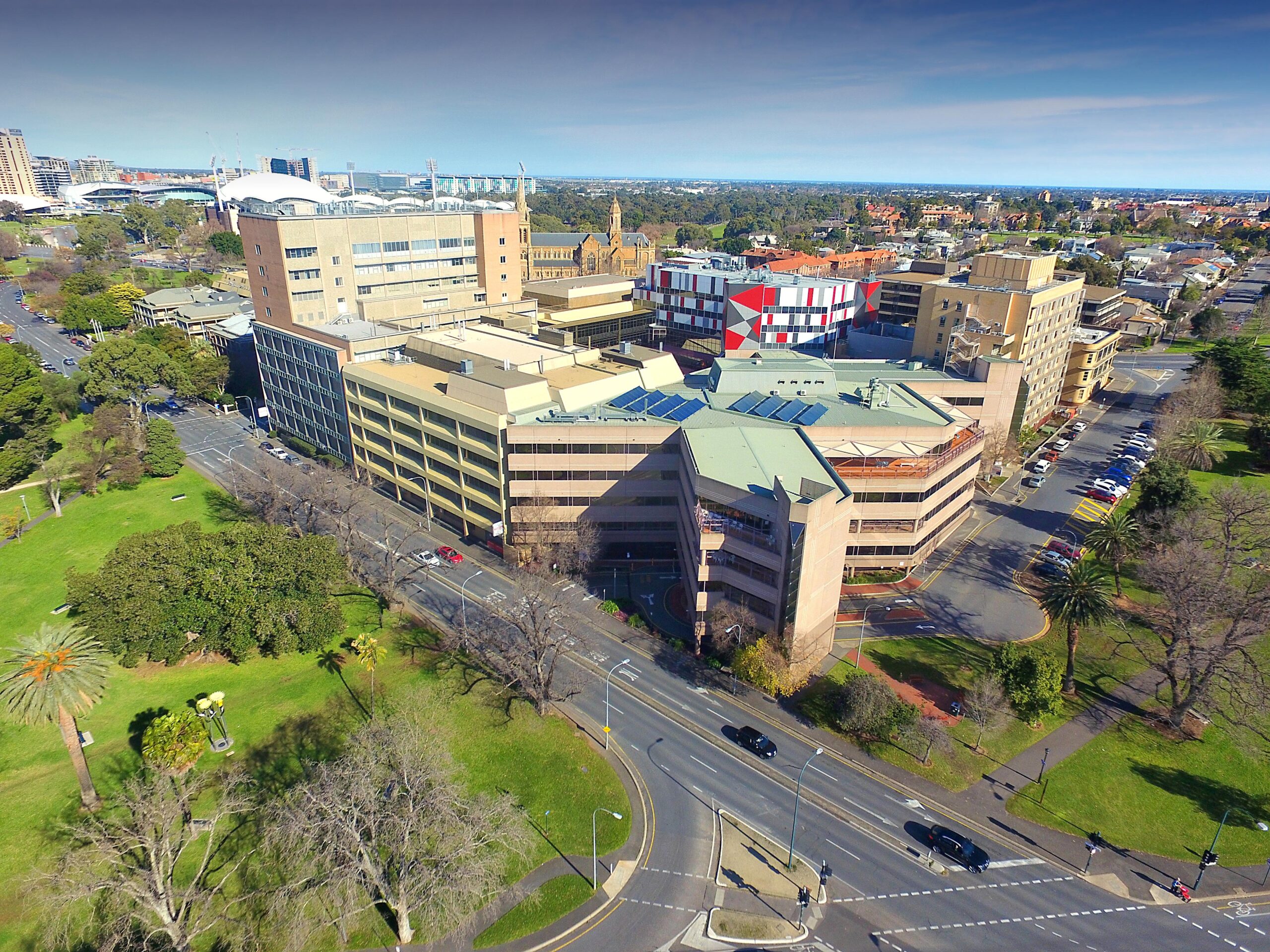 Women’s and Children’s Hospital
Women’s and Children’s Hospital
Yorke and Northern Local Health Network
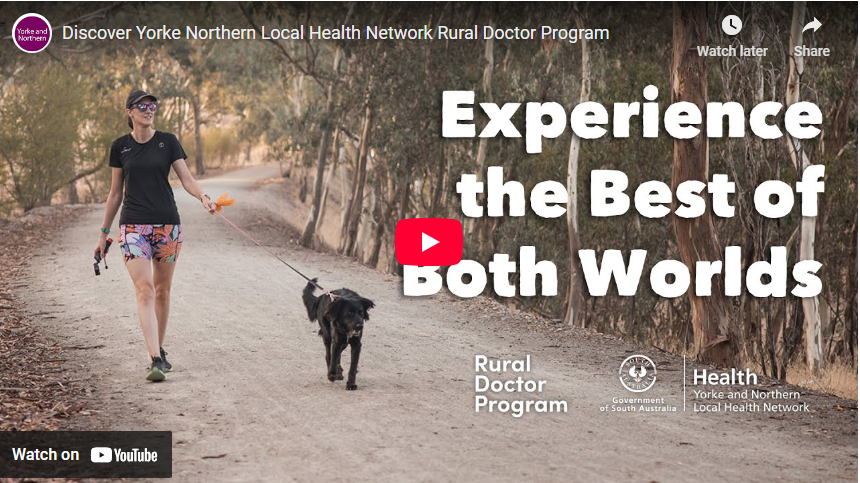 View the YNLHN video on Discover Yorke Northern Local Health Network Rural Doctor Program’
View the YNLHN video on Discover Yorke Northern Local Health Network Rural Doctor Program’
YNLHN Rural Doctor Program
The Yorke and Northern Local Health Network, Rural Doctor Program (YNRDP) offers a range of primary care and hospital based clinical experiences across our region in picturesque locations such as Clare, Port Pirie, Jamestown, Crystal Brook, Kadina, Maitland and Wallaroo.
You will work closely with specialists, general practitioners and rural generalists in a multi-disciplinary team setting, allowing you to develop close relationships with colleagues and gain hands-on clinical experience in a supportive teaching environment. As part of a small cohort, you will benefit from individualised support provided by the Medical Education Team. You will be able to challenge yourself with procedural skills only taught to senior trainees in the metropolitan hospitals. The aim is for prevocational doctors to be able to work with supervised autonomy so that they develop confidence and skills in preparation for independent practice.
The Yorke and Northern Local Health Network comprises multiple sites across the region and works collaboratively with General Practices to create quality educational experiences for prevocational doctors.
Interns and PGY2+ doctors can chose their own adventure based on interests, career goals and personal needs. Yorke and Northern provide unmatched flexibility in rotation options. Trainees may select a year of four clinical terms in one place to be close to family or a spouse. Or they may chase learning opportunities across the region.
YNLHN provide suitable accommodation for trainees at no cost for their first two years, whatever rotations the trainee chooses.
-
Health Services and Facilities
The Yorke and Northern Local Health Network comprises multiple sites across the region and works collaboratively with General Practices to create quality educational experiences for prevocational doctors. Our sites include:
- Port Pirie Hospital
- Wallaroo Hospital
- Goyder’s Line Medical and Jamestown, Orroroo
- Crystal Brook and Laura Medical Practices and Hospitals
- The Terrace Clinic, Port Pirie
- Clare Medical Centre and Clare, Burra and Snowtown Hospitals
- Kadina Medical Associates, Kadina
- Medical HQ Ardrossan, Maitland Hospital and Point Pearce Aboriginal Health Clinic
-
Lifestyle
The Yorke and Northern Local Health Network encompasses the Yorke Peninsula, Southern Flinders Ranges, the Mid North, and stunning Clare Valley Wine region. It is a beautiful and diverse area of South Australia. It comprises breathtaking national parks, walking trails, cycling, art and photography, outback camping, four-wheel driving adventures, swimming, snorkelling and a wealth of dining experiences including wineries, breweries, and distilleries. Most, within a two-hour drive from Adelaide!
The MEU encourage trainees to explore the region and integrate into communities, so we are committed to limited overtime, flexible working hours and a focus on wellbeing.
As the trial region for the RISE (Rural Integration and Social Inclusion) Program, prevocational doctors can access funding for experiences across the region, integration into sports and recreation clubs or associations for themselves and immediate family members.
-
Internship
educational opportunities
Interns have the opportunity to obtain a wide range of clinical experiences in emergency medicine, general practice, medical inpatients, anaesthetics, obstetrics, Aboriginal Health, environmental medicine, retrieval and emergency response medicine, surgical procedures and skin cancer medicine and aged care. All of which are in the context of rural and remote settings.
We provide a comprehensive educational program addressing the requirements of the AMC National Framework for Prevocational (PGY1 and PGY2) Medical Training. Formal teaching sessions include:
- A comprehensive orientation to the region and its health services
- Weekly Intern Tutorial Program:
- Tutorial attendance is protected and paid time for junior doctors
- Program developed in collaboration with interns and term supervisors delivered by local and visiting specialists covering core skill requirements
- Additional training workshops aimed at preparing junior doctors for practice in rural medicine but relevant to any clinician
- Clinical simulation scenario-based workshops
- Regular wellbeing activities
- Additional funded educational activities including Country X-ray Training, Advanced Life Support 2, Neonatal Advanced Life Support, Point of Care Ultrasound Training
supervision and support
Term rotations are supervised by experienced and approachable senior clinicians with a genuine interest in teaching and supervision. You will meet with your supervisor at the start of your rotation and complete your Personal Learning Objectives for the coming term. Your supervisor will support the meeting of these objectives and provide continual feedback throughout your rotation and together you will complete a mid-term (formative) and end of term (summative) assessments. In addition to your Term supervisor, you will have support from clinical supervisors who work within the clinic or ward.
The YNLHN Rural Doctor Program is supported by our Director of Clinical Training (DCT), Medical Education Officer (MEO), and Medical Liaison Officer (MLO) who comprise the Medical Education Unit (MEU). The MEU is responsible for orientation, pastoral support and coordination of the education program and interns are encouraged to discuss any issues or concerns. During the year, the MEU will meet with you to receive your feedback on rotations and the teaching program and to discuss any concerns you would like to raise and discuss how we can assist you in your career pathway.
The YNLHN is a vast region, covering multiple regional communities and therefore the MEU is remotely based and will travel regularly for visit sites to check on the welfare of junior doctors and address any issues that arise.
rotations
When allocating rotations, intern rotation preferences and annual leave requests will be taken into consideration along with service requirements of the region. Every effort is made to ensure that rotations reflect the intern’s preferences, interest, and career direction.
Intern rotations within the region align to PGY2 rotations (4 x3 monthly rotations).
Intern Rotations for 2026
- Port Pirie Hospital, Emergency
- Port Pirie Hospital, Anaesthetics and Surgery
- Wallaroo Hospital, Emergency
- Wallaroo Hospital Medical Inpatients
- Wallaroo Hospital, Anaesthetics and Surger
- Goyder’s Line Medical (Jamestown, Orroroo), GP, Emergency, Inpatients, Procedural
- Crystal Brook and Laura Medical Practices and Hospitals, GP, Emergency, Inpatients
- The Terrace Clinic, Port Pirie, GP and Medical Inpatients
- Clare Medical Centre and Clare, Burra and Snowtown Hospitals, GP, Emergency and Inpatients
- Kadina Medical Associates, Kadina, GP Obstetrics
- Medical HQ Ardrossan, Maitland Hospital and Point Pearce Aboriginal Health Clinic, GP, Emergency and Inpatient
Interns are rostered to weekdays with the opportunity to participate with occasional on call shifts for small rural hospitals as negotiated with their supervisors. Overtime is strictly limited.
Minimal weekend and overnight shifts allow a balance of work and life during your intern year. Interns in YNLHN do not work service terms such as relieving.
YNLHN are offering remuneration packages in line with the SA Salaried Medical Officers Award with additional benefits including relocation and travel allowances. Accommodation and utilities will be provided at no cost to the Trainee for the first two years of employment. New medical employees are also entitled to the Regional Incentive Payments.
-
PGY2+
The YNRDP provides a full year training and skills experience for prevocational doctors who have completed an internship and have general registration with the Medical Board of Australia.
We will have on offer 4 x PGY2+ positions in 2026 across the region. Prevocational Doctors will have 4 x 3-month rotations with supervision and training in accordance with the new AMC framework. There are a wide variety of positions available for prevocational doctors to select based on their interests and career objectives.
Rotations include:
- Emergency Medicine at either Wallaroo or Port Pirie Hospital where you will experience a wide variety of presentations in patients of all ages.
- Medical Inpatients at Wallaroo where you will care for a wide variety of patients of all ages and clinical problems.
- Obstetrics at Port Pirie Hospital.
- Surgery and Anaesthetics at Port Pirie Hospital assisting in daily surgical lists, pre-operative outpatient clinics and care of post operative patients.
- Surgery and Anaesthetics at Wallaroo Hospital assisting in daily surgical lists, pre-operative outpatient clinics and care of post operative patients.
- GP/Obstetrics at Kadina caring for a wide variety of presentations in general practice with a focus on Women’s Health.
- GP/ED in Crystal Brook and nearby hospitals. There will be a mix of general practice, emergency medicine and inpatient care as well as involvement with anaesthetics, and obstetric care.
- GP/ED/Anaesthetics at Jamestown and neighbouring towns. Working with a team with a wide variety of skills in general practice and hospital medicine including anaesthesia and obstetrics.
- GP/ED/Procedural based at Clare you will see a variety of emergency presentations, care for inpatients, attend surgical lists and be involved with anaesthesia.
- GP/Medical inpatients working at Port Pirie Terrace Clinic and seeing patients in the Port Pirie Medical Ward.
- Paediatrics split across both the Women’s and Children’s Hospital and Port Pirie Emergency Department.
- Yorke Peninsula Aboriginal Health and Rural Medicine working across Maitland Hospital, Medical HQ Ardrossan and Point Pearce Aboriginal Health Clinic.
Opportunities beyond PGY2
The YNLHN offers up to 5 year contracts for junior doctors, to allow them to complete their entire training to become a general practitioner or rural generalist with RACGP or ACRRM. However, the training opportunities are tremendously worthwhile for early career doctors with other career goals.
YNLHN offers Single Employer Model registrar positions for GP registrars wishing to continue employment with SA Health while undertaking GP training.
Wallaroo Hospital is now accredited to provide Advanced Skills Training in Emergency Medicine, as well as the Advanced and Intermediate Emergency Medicine Training certification with Australian College of Emergency Medicine.
Clare Hospital and Medical Centre, in conjunction with Northern Adelaide Palliative Care service is accredited to provide Advanced Skills Training in Palliative Care.
Wallaroo Hospital and Kadina Medical Associates are accredited to provide training for the RANZCOG Certificate of Women’s Health and Procedural Training Programs.
supervision and support
Term rotations are supervised by experienced and approachable senior clinicians with a genuine interest in teaching and supervision. You will meet with your supervisor at the start of your rotation and complete your Personal Learning Objectives for the coming term. Your supervisor will support the meeting of these objectives and provide continual feedback throughout your rotation and together you will complete a mid-term (formative) and end of term (summative) assessments. In addition to your Term supervisor, you will have support from clinical supervisors who work within the clinic or ward.
The YNLHN Rural Doctor Program is supported by our Director of Clinical Training (DCT), Medical Education Officer (MEO), and Medical Liaison Officer (MLO) who comprise the Medical Education Unit (MEU). The MEU is responsible for orientation, pastoral support and coordination of the education program and prevocational doctors are encouraged to discuss any issues or concerns. During the year, the MEU will meet with you to receive your feedback on rotations and the teaching program and to discuss any concerns you would like to raise and discuss how we can assist you in your career pathway.
The YNLHN is a vast region, covering multiple regional communities and therefore the MEU is remotely based and will travel regularly for visit sites to check on the welfare of prevocational doctors and address any issues that arise.
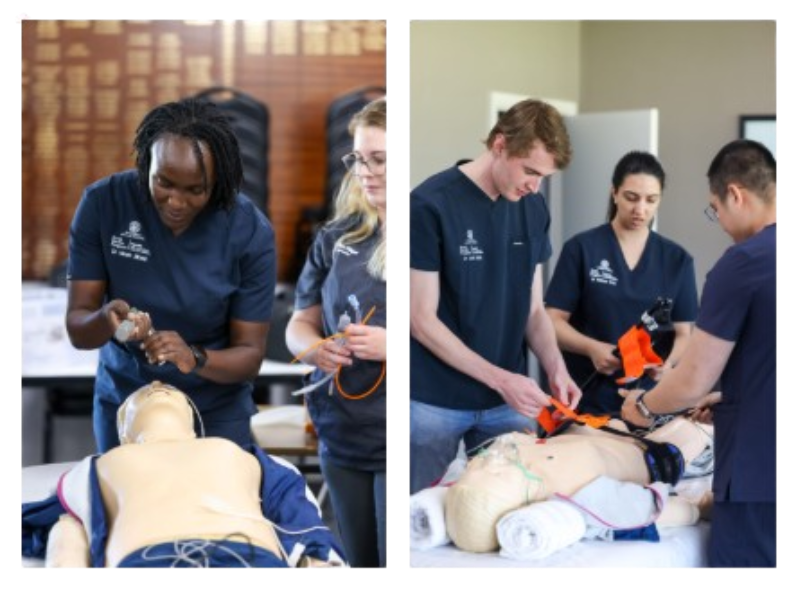
For more information on the YNLHN Rural Doctor Program:
To find out more about YNLHN services and how to access them:
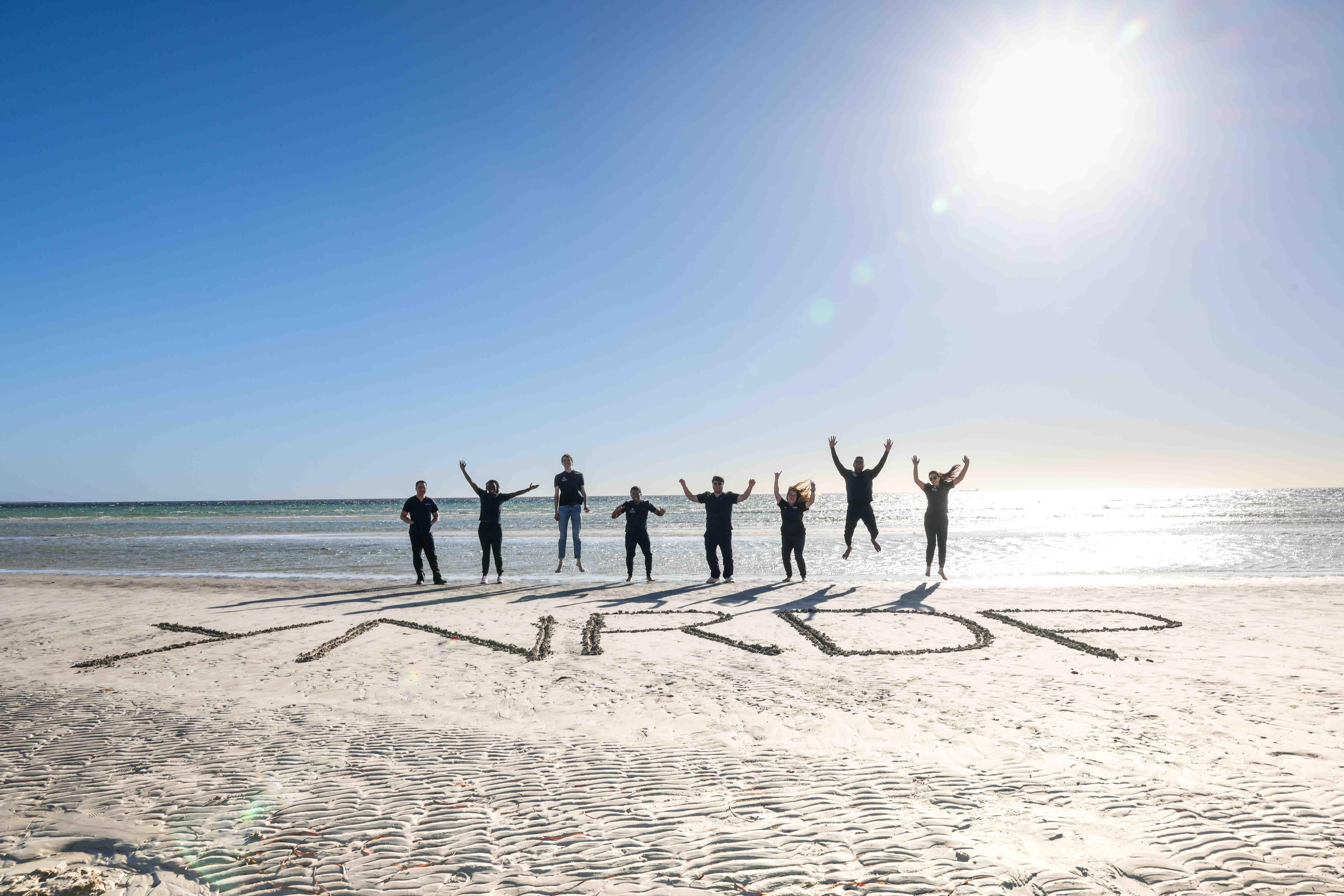 Image courtesy of YNLHN
Image courtesy of YNLHN
The Adelaide Prevocational Psychiatry Program (TAPPP)
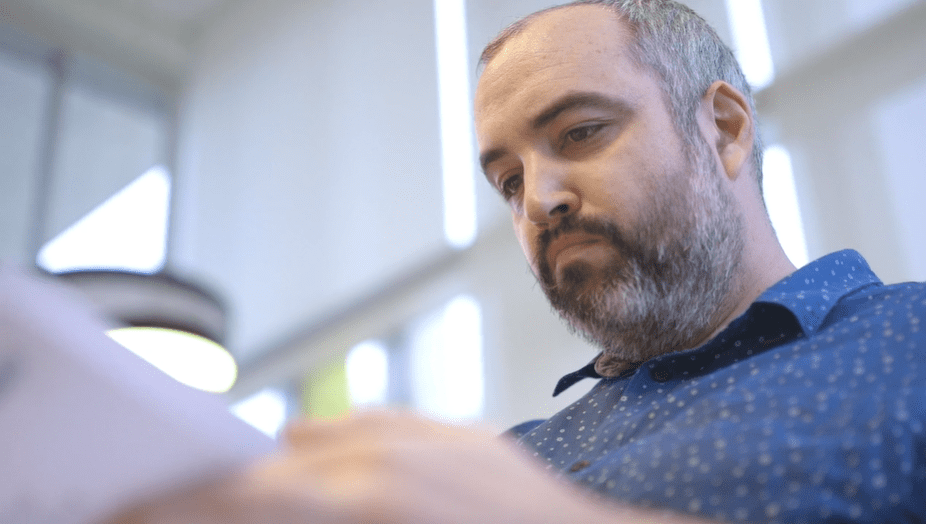 View the TAPPP video for more information.
View the TAPPP video for more information.
The Adelaide Pre-Vocational Psychiatry Training Program (TAPPP) positions are suitable for Prevocational Medical Officers (PMOs) looking to gain prevocational experience in Psychiatry, and for GP and other speciality trainees who would like to gain an increased exposure to psychiatry training. This program provides an opportunity for doctors to increase their knowledge in managing mental health conditions without enrolling in a specialist training program.
TAPPP offers a 12-month pre-vocational PMO training program. The rotations offered will map to the new AMC framework for PGY2 PMOs. Normally the rotations are 6 months in duration, however there are some 3 month rotations to meet the AMC Framework requirements. TAPPP promotes and encourages participants who have an interest in psychiatry as a future career, but also those who are considering specialities such as emergency medicine and general practice (GP) where mental health issues are highly represented. The program is accredited for GP trainees as a general hospital rotation or as an “extended skills” post.
The program is run in collaboration with other LHNs, but the medical education unit and its associated resources are situated within Central Adelaide Local Health Network (CALHN). Positions are available in various locations throughout Adelaide.
Currently the TAPPP positions are held in:
- CALHN
- NALHN
- SALHN
- BHFLHN
-
Rotations within TAPPP
PMOs are allocated to accredited positions. Rotation availability varies from year to year depending on RANZCP Training requirements. For PGY2 PMOs, the combination of rotations allocated will meet the certificate requirements of the new AMC framework. Preference for which Local Health Network you would like to work in is sought prior to SA MET ranking and allocated as per interview rankings.
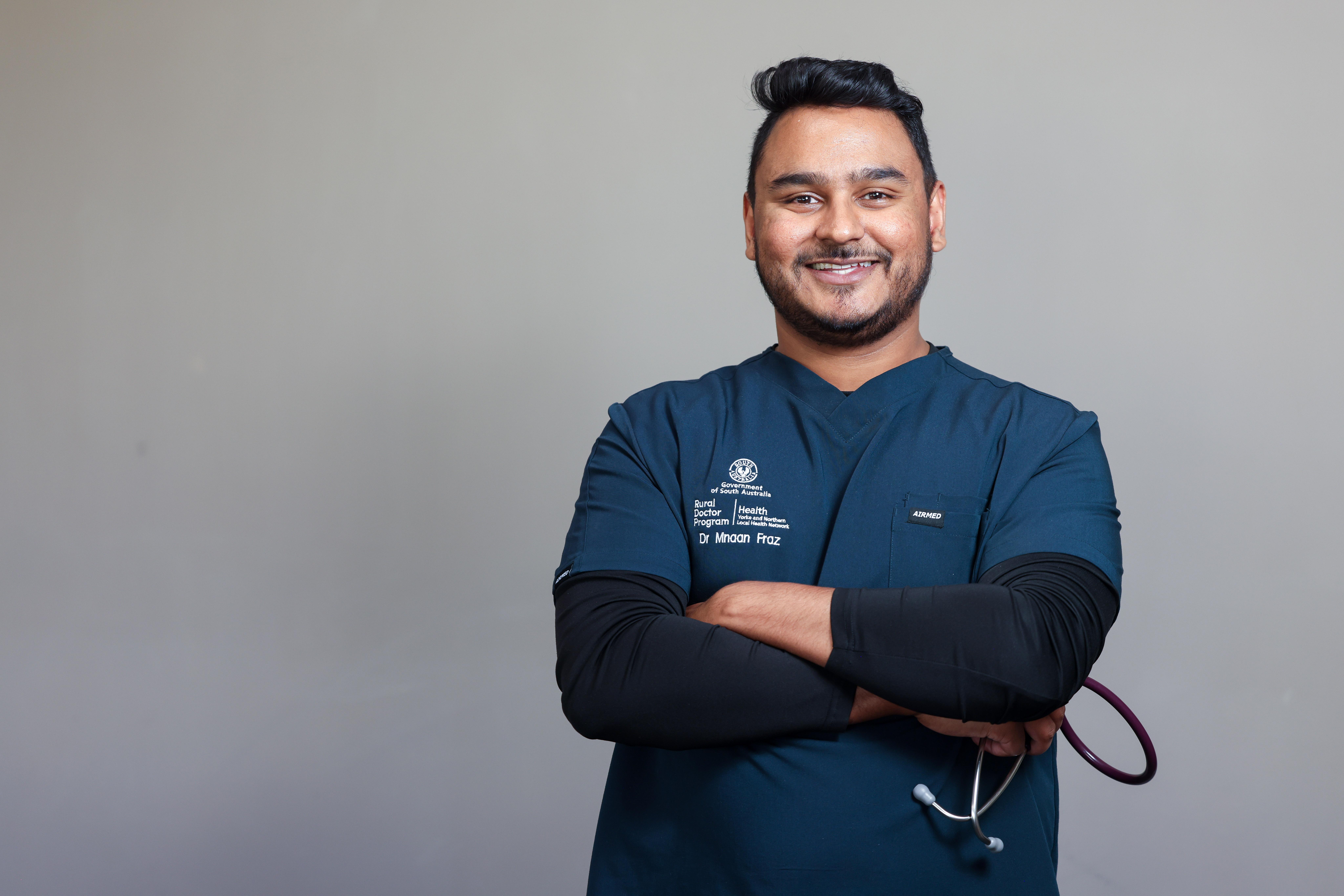 Image courtesy of YNLHN
Image courtesy of YNLHN 


